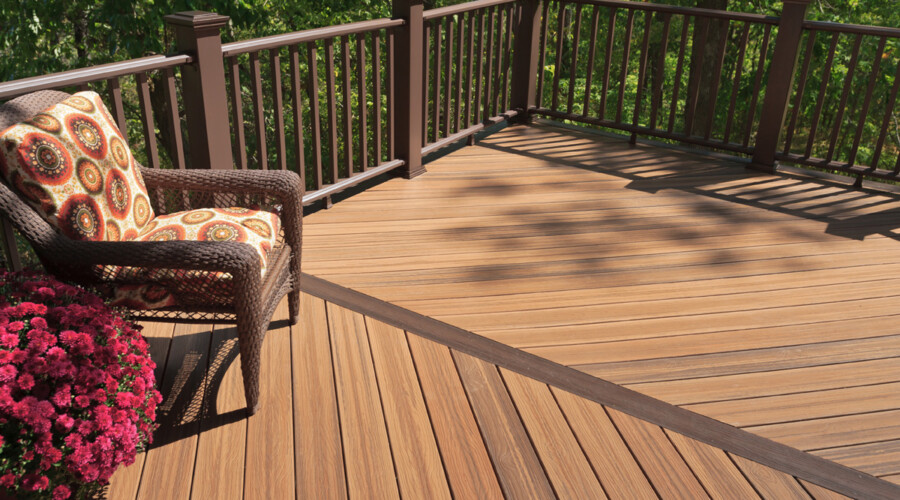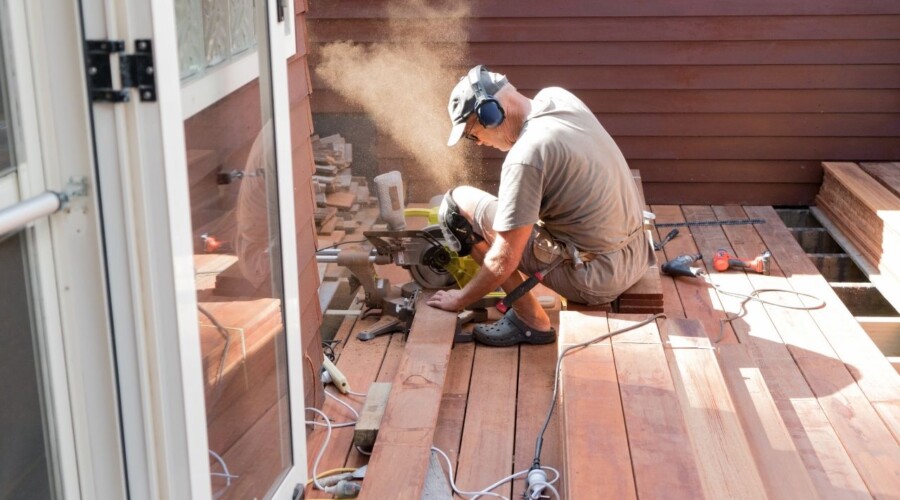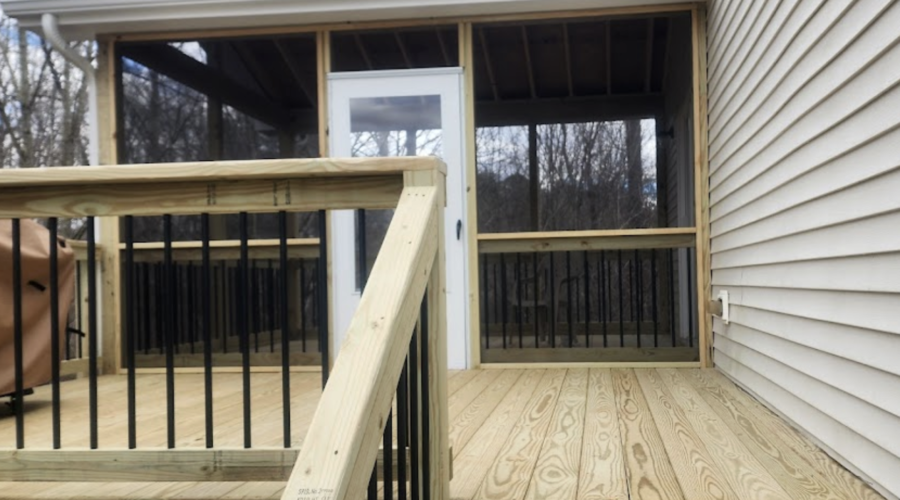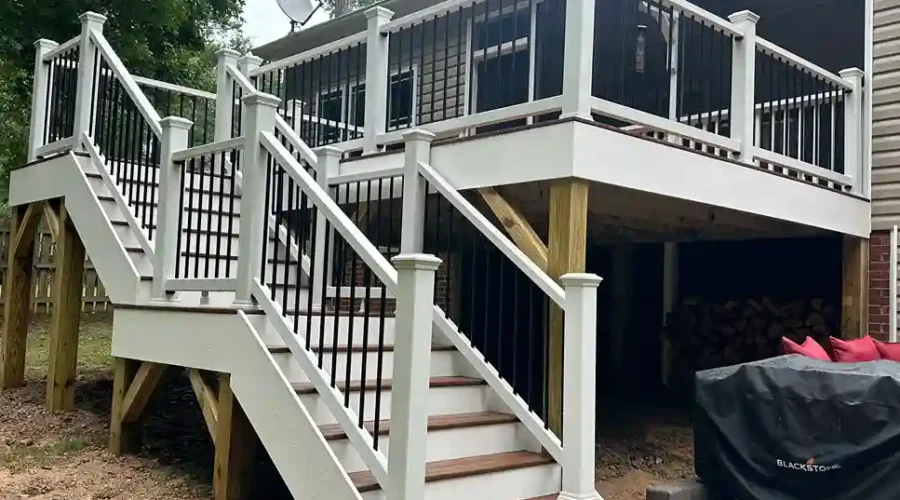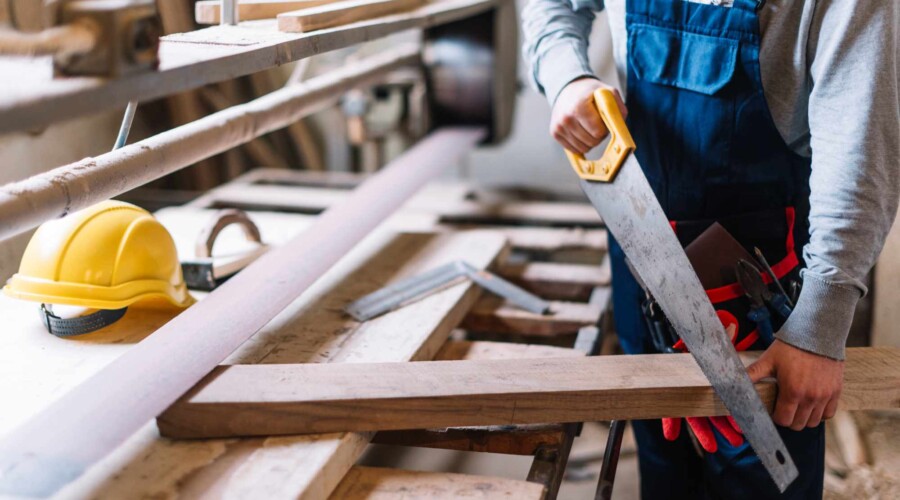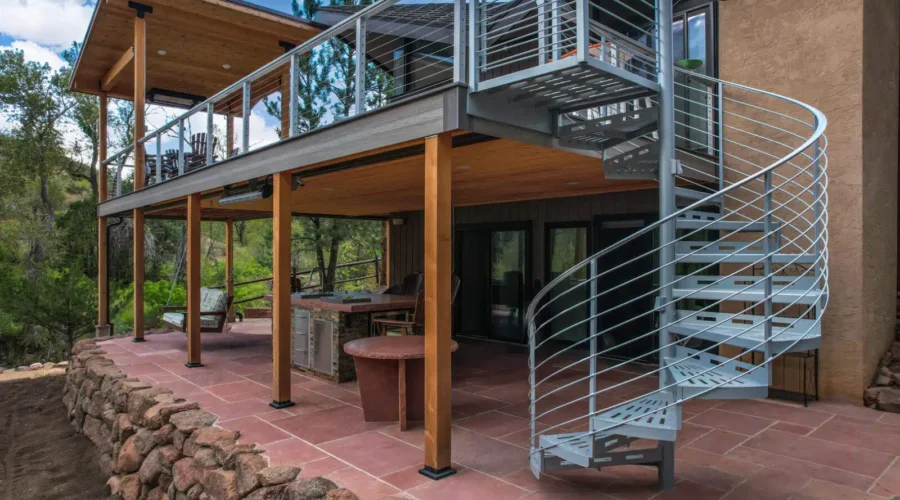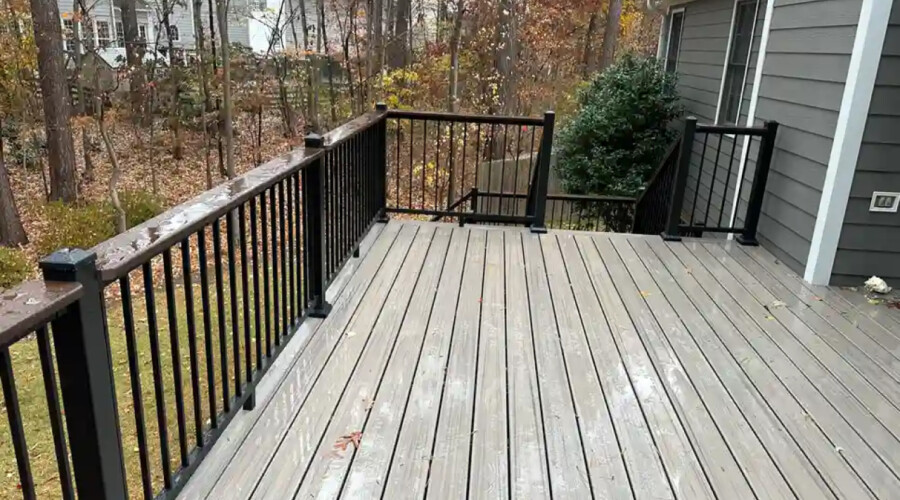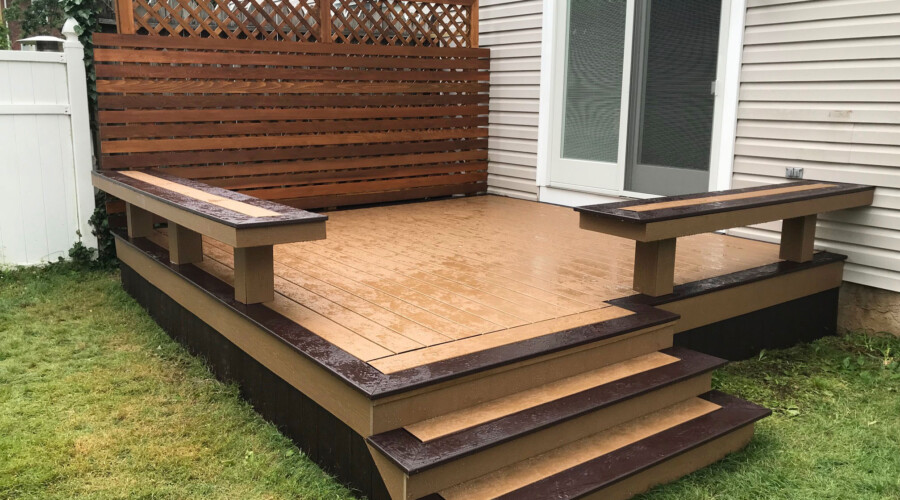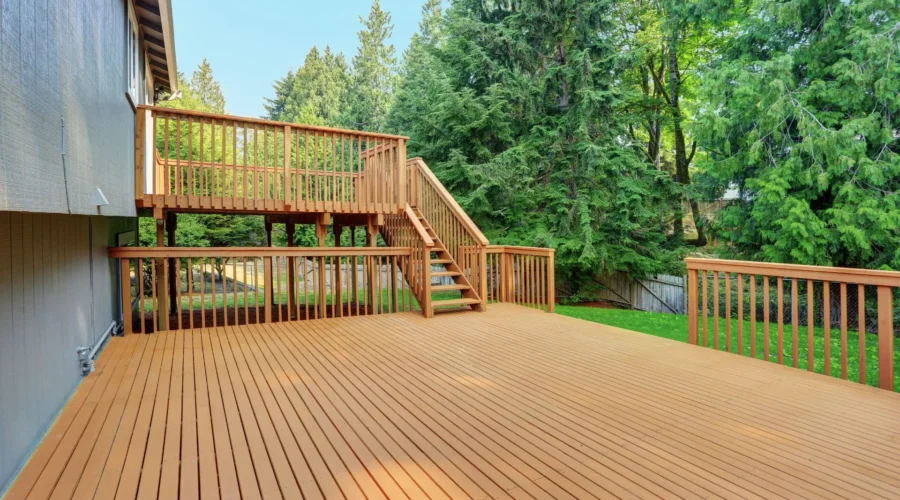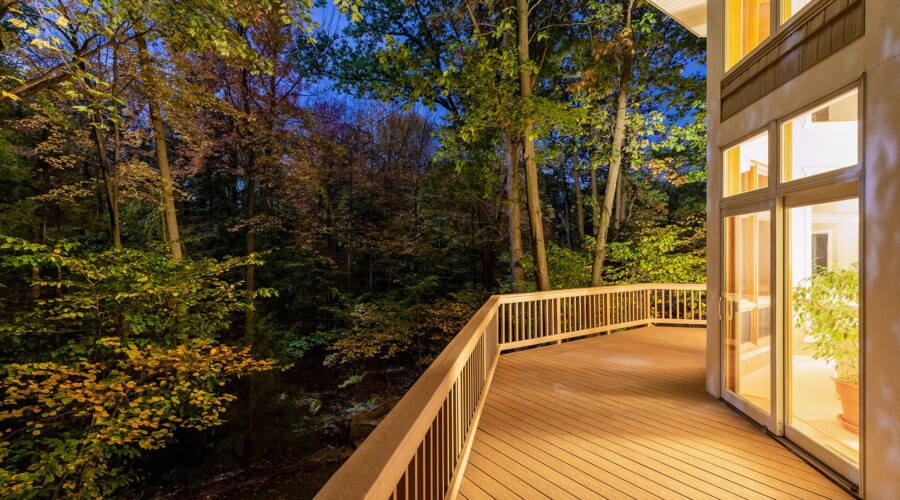Hidden Deck Building Costs in Raleigh: What Contractors Hide
We’ve noticed many homeowners in Raleigh who receive estimates for decks get paralyzed when they consider all the possible hidden costs that might be lurking outside of the written estimate. Any homeowner with experience in renovation projects knows that the project doesn’t always complete at exactly the price mentioned. But your ideal deck is so close, it would be a shame to put off a whole project because of a few hidden costs. So, in this article we are going to explore all potential surprise invoices that could possibly arise on a deck project.
At AAA Fence & Deck, we believe you deserve transparency on your deck build from the start. As a family and veteran-owned company with over 30 years of experience serving Raleigh and the Research Triangle, we’ve built our reputation on honesty and quality. We’re here to pull back the curtain on the hidden costs some contractors won’t mention until it’s too late. Our goal is simple: to arm you with the knowledge to build your dream deck on budget, without any nasty surprises.
Beyond the Boards: Uncovering Hidden Cost #1 – Permits & Regulations

Before a single post is set, there’s paperwork. Navigating Raleigh’s building codes and permit process can be a maze of fees and requirements that many contractors conveniently leave out of the initial quote.
In Raleigh, a permit is required on all deck builds. The rules can get even more specific:
- Surveys: If your contractor is pulling the permit, a stamped survey of your property is often required.
- Historic Districts: Live in a historic part of town? You’ll likely need a Certificate of Appropriateness, which adds another layer to the process.
- HOA Approvals: Beyond city permits, your Homeowners Association has its own set of rules and approval processes that need to be managed.
This “paperwork tax” isn’t just about money; it’s about your time and peace of mind. That’s why we handle the entire permit and HOA preparation process for you, ensuring your project is fully compliant from day one. As one happy customer noted, we “assisted in permitting and answered every single question”.
Preparing the Canvas: Uncovering Hidden Cost #2 – Site Preparation

Your backyard isn’t always the perfect blank slate a contractor might assume in their initial, low-ball quote. The reality is, preparing the ground for a safe and stable deck often involves extra work that can drive up the cost.
Watch out for these common site prep costs:
- Demolition and Removal: Have an old, rickety deck or a cracked patio that needs to go? That’s extra labor and disposal fees. In one project, our team was replacing old decking boards when we discovered the underlying joists were in bad shape—an unexpected but crucial repair we handled at cost for the homeowner.
- Grading and Leveling: A sloped or uneven yard needs to be properly graded to ensure your deck is structurally sound and drains correctly.
- Access Issues: If your backyard is hard to reach with equipment and materials, expect labor costs to increase.
If you’ve hired a good contractor they will inspect the site thoroughly before you’ve started work and discuss these potential costs upfront. We actually made a list of red flags to look for when hiring a deck contractor that you can read here. We believe in transparent, itemized quotes so you know exactly what you’re paying for, with no hidden fees.
The Allure of the Upgrade: Uncovering Hidden Cost #3 – Materials & Timing
The price in a basic quote is almost always for standard, pressure-treated pine. But what if you’re dreaming of something more durable or stylish? That’s where material upgrades can significantly impact your budget.
- Wood Options: Moving from standard pine to premium woods like cedar or redwood adds a touch of luxury, but also comes with a higher price tag.
- Composite Decking: For a low-maintenance, long-lasting, and eco-friendly option, composite is king. Made from recycled materials, it resists rot and insect damage. As a Trex Pro certified installer, we specialize in these beautiful, durable decks, but it’s important to know they are a larger initial investment.
- Railing Systems: The railing is a major aesthetic and safety feature. Upgrading from simple wood balusters to ornamental aluminum or a custom cable railing system can be a significant—and often overlooked—cost.
- Seasonal Fluctuations: Material costs and labor availability can shift with the seasons. Building in the peak spring season might cost more than in the off-season.
Our design experts will walk you through all your options, explaining the cost-benefit of each choice so you can create a custom deck that fits your style and your budget.
Your Shield Against Surprises: The “What to Ask Your Contractor” Checklist

To protect your investment and avoid misunderstandings, you need to ask the right questions. Use this checklist as your guide during your consultation:
- “Is your quote fully itemized? Can I see a breakdown of materials, labor, permits, and other fees?”
- “Does this price include demolition of my old deck and debris removal?”
- “Who handles the permit and HOA applications, and is that cost included?”
- “What kind of warranty do you offer on labor and materials?” (We offer a labor warranty with free repairs to ensure your satisfaction).
- “Are you fully insured and bonded?” (AAA Fence & Deck is, for your peace of mind).
Why Raleigh Trusts AAA Fence & Deck

For over three decades, we’ve been more than just builders; we’re your neighbors. We are a family and veteran-owned business with an A+ BBB rating, committed to unparalleled craftsmanship and customer-focused solutions. Our clients praise our responsiveness, fair pricing, and honesty. We don’t just build decks; we build lasting relationships founded on trust.
Get a Transparent Quote Today!
Ready to build your dream deck without the financial nightmares? Ditch the hidden fees and choose a partner who values transparency as much as you do.
Schedule your free, no-obligation consultation with our experts. We’ll assess your property, listen to your vision, and provide a clear, comprehensive quote you can count on.
Call us anytime at 984-333-5131 or fill out our online form to get started. Let’s build your perfect outdoor space—on time and on budget.
FAQ
What's the cost difference between a wood deck and a composite deck in the Raleigh area?
A wood deck, typically using pressure-treated pine, has a lower upfront cost, making it a popular choice. A composite deck is a larger initial investment, but it offers significant long-term savings because it's low-maintenance, resistant to rot and insects, and often comes with a lifetime warranty. As Trex Pro certified installers, we specialize in high-quality composite decks that provide lasting value for homeowners in areas like Durham, Cary, Wake Forest, and Apex.
Does your initial quote include the cost of demolishing and removing my old deck?
Our quotes are transparent and itemized to avoid surprises. We will discuss demolition and removal during your free, no-obligation consultation and include it as a specific line item in your proposal if needed. We believe in clear communication, which is why customers praise our process, noting everything is "exactly how... we discussed".
What areas do you serve besides Raleigh?
We are proud to serve communities all across the Research Triangle area. Our service areas include Durham, Cary, Chapel Hill, Garner, Apex, Fuquay-Varina, Wake Forest, Clayton, Morrisville, and many more surrounding towns. Our headquarters in Raleigh on Creedmoor Road allows us to efficiently manage projects throughout the region.
What kind of warranty do you offer on deck construction?
We stand behind our work with an industry-standard labor warranty that includes free repairs for any issues that arise during the warranty period. We use only the highest quality materials and superior craftsmanship to build structures that stand the test of time, ensuring your investment remains in top condition.
Can you customize a deck to match my home's style?
Absolutely! We specialize in customized deck solutions tailored to your unique needs and preferences. Our design experts collaborate with you to select the right materials, from various wood species to composite colors, and design features like ornamental aluminum or custom railings to perfectly complement your home’s architecture. We’ve made some very interesting decks - one recent project in the Caraleigh neighborhood near the Mt Hope Cemetery stands out because of the steep slope of the property. We’ve built so many decks there is not a surprise that we haven’t seen before.
5 Red Flags When Hiring Triangle Deck Builders (Avoid These)
You don’t want to hire the wrong person to build your deck. There are far too many things that can go wrong by hiring unqualified deck builders or having your handyman build the deck. Risks include both cost overruns and safety concerns. In this article we are going to talk about the most common red flags you may run into when collecting new deck estimates.
The Research Triangle area has seen rapid growth recently. This boom has attracted skilled professionals but also shady contractors looking to cash in on the growth. With many options in Raleigh, Durham, Cary, and nearby communities, it’s tough to find the right deck builder.
The Triangle market poses unique challenges that need local know-how. Navigating different permits in Wake and Durham counties is just one part. Understanding how North Carolina’s clay soil and humid climate affect deck building is important if you care about durability. A deck made by someone who doesn’t know these conditions might seem fine at first. But it could face big issues much sooner than expected.
Here’s what to watch for when choosing deck builders in the Research Triangle area.
Red Flag #1: No Local References or Portfolio

One of the most obvious warning signs you can spot is a lack of local references or portfolio of work. If they are experienced elsewhere it’s not the same as here. And if customers won’t speak on their behalf then it’s not someone you want to work with. Their recent projects should be in the Triangle or references from neighbors in Raleigh, Durham, Cary, or nearby areas.
Don’t fall for stock photos. Those are some of the easiest to spot as they are often immaulate beyond what a normal fence should look like. Same with ones generated with AI – the details are often slightly off. We have seen companies use other company’s photos to mask their lack of experience – so ask about the details of each project and trust your gut. Without real local references, you can’t confirm their skills or reliability.
Let me give you an example for why hiring local, especially in the Triangle is important. For one, ther permitting requirement are tricky. Also, we have a lot of red clay in our area – if the posts are not set properly to account for how the clay acts differently in rain or dry you could be in trouble as it settles. The humid subtropical climate requires careful material choices and good ventilation to prevent moisture and mold issues.
There are further benefits for the home owner when it comes to warranty and quality issues. If they are local you can find them again to come fix it. If you hired someone from the shadows they will return to the shadows when you need them.
Red Flag #2: Significantly Low Bids – Too Good to Be True

We’ve all heard the saying, “if it sounds too good to be true, it probably is.” This is especially true for deck construction bids. If you get a quote that’s much lower than others—say, 30% or more below average—be very cautious before accepting. While everyone likes a deal, extremely low bids often mean something is missing, being unsaid, or the materials may not be up to snuff.
Low-ball contractors usually get their low prices through questionable methods. They might use cheap materials that seem fine but quickly wear out in North Carolina’s weather. Instead of pressure-treated lumber rated for ground contact, they might use untreated wood that rots in a few years. They might skip stainless steel or galvanized fasteners. Instead, they could use regular screws. These screws won’t hold up and will leave rust stains after just one winter.
Labor costs are another area where dishonest contractors like to save. They hire inexperienced workers who can’t install joists, beams, and decking boards correctly. Poor installation can lead to squeaky boards, uneven surfaces, and even dangerous failures.
The hidden costs are often hidden in the insurance. Many low-ball contractors skip insurance. Anything that happens on your property leaves you liable. They might skip permit applications to save time and money, which could create legal issues when you try to sell your home. The worst ones present a low cost to start and then hit you with change orders during the project as if your should have known.
Quality deck construction requires investing in good materials and skilled labor. Reputable contractors give clear, detailed quotes. These show what materials will be used and what work will be done. They explain why certain materials and techniques cost more but offer better long-term results. While their bids may not be the lowest, they reflect fair pricing for lasting work.
Some contractors trust their pricing. They offer price match guarantees for valid, written bids from licensed competitors, like AAA Fence & Deck. This shows their commitment to fair pricing while ensuring you don’t sacrifice quality for a lower price.
Red Flag #3: Pushy Sales Tactics and Door-to-Door Approaches

If someone knocks on your door claiming to be a deck contractor with leftover materials, be cautious. They might offer you a “special deal” if you sign today. This high-pressure tactic is rarely from reliable contractors. Good deck builders don’t need to knock on doors; their reputation keeps them busy.
Pushy sales tactics come in many forms. They all aim to rush your decision. Some contractors might say their “special pricing” ends during the visit, creating urgency to pressure you. Others may claim they have “leftover materials” from another job to offer a steep discount. In truth, they may just want to unload poor-quality materials.
Red Flag #4: No Proper Licensing, Insurance, or Bonding Documentation

Not enough homeowners check on the licensing and insurance of their contractors. In the search for lowest price it is wild what many homeowners will turn a blind eye towards. It is so risky to have a contractor at your house without insurance. A single injury can bankrupt you as your the liable party for all injuries. You need protection when someone works on your property, especially for major projects like deck construction.
Here are the rules in North Carolina for licensing. In North Carolina, contractors doing work over $30,000 must be licensed by the state. Even for smaller projects, using licensed contractors is still important.
Insurance is crucial and non-negotiable. General liability insurance protects you if the contractor damages your property while on-site. For example, if heavy equipment breaks a gas line or harms your home’s siding, this insurance comes into play. Workers’ compensation protects you if a worker gets injured on your property. Without it, you could be liable for medical bills and lost wages, which can add up quickly.
Verifying credentials is straightforward but requires some effort. Ask for current insurance certificates and confirm them directly with the insurance company. Check contractor licenses on the North Carolina licensing board’s website.
Established contractors often exceed basic requirements. They might have A+ ratings from the Better Business Bureau. They could also be members of professional groups like the American Fence Association or local chambers of commerce.
Red Flag #5: Can’t Explain Local Building Code Requirements
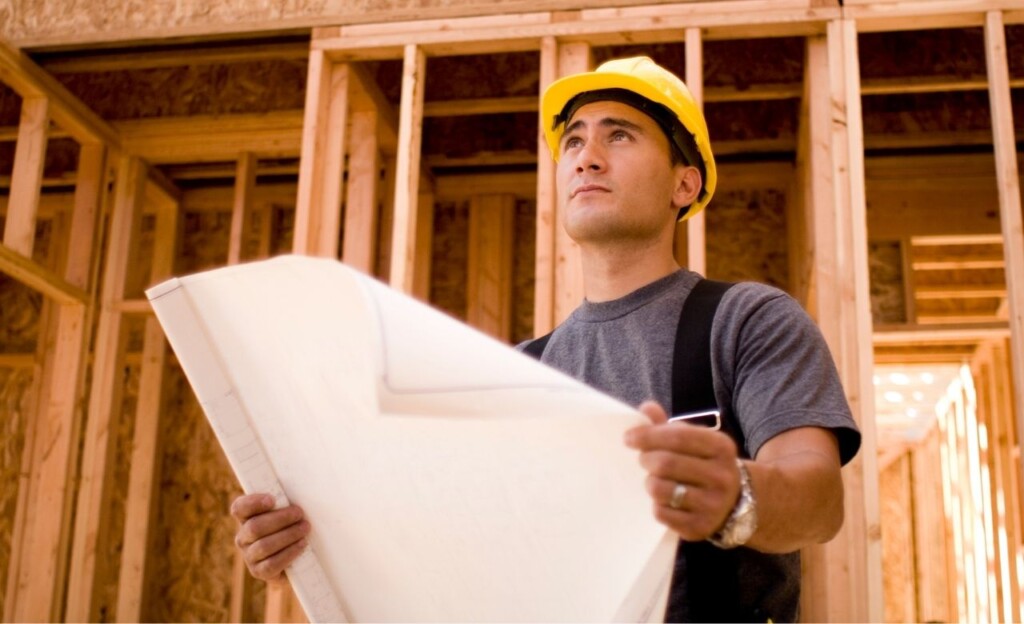
One of the easiest ways to know if the contractor is a pro or not is to do a little research yourself on local regulations and then ask the contractor about it when they are at your house. If they can’t recite the rules then you know it’s not a legitimate company. If they roll their eyes and say “don’t worry about permits” or call them “just another government money grab,” walk away. Fast.
This attitude screams inexperience and incompetence. Or worse—they know the rules but plan to ignore them anyway. Either way, you’re the one who’ll pay the price later.
Building codes exist for a reason. People got hurt when structures weren’t built right. Property gets damage. So now we have rules. In the Triangle, you’ve got North Carolina state codes plus whatever your specific city decides to throw at you. Raleigh has different requirements than Durham. Cary does things a bit different than Wake Forest. A good contractor knows this stuff cold.
They should be able to explain why deck posts need concrete footings below the frost line. (Yes, North Carolina has a frost line.) They’ll know that most decking requires joists spaced 16 inches on center, but composite materials might need tighter spacing. If a deck or raised platform is 30 inches or more above the adjacent grade, it needs guardrails at least 36 inches high. Open sides of stairs with a total rise over 30 inches need guardrails, and handrails if there are 4 or more risers. Balusters / openings must be such that a 4-inch sphere cannot pass through. Handrails must be 34-38 inches high (for stairs) from the nosing.
Live in a neighborhood with an HOA? That’s another layer of fun. The committee usually has an opinion about your deck color, materials, and design that should be accounted for.
Professional contractors handle permits easily because for them, it isn’t. They know which projects need permits in which precincts. They’ve filled out the applications a hundred times. They have relationships with building officials and know how long approvals typically take. Most importantly? They’re not scared of inspections because their work passes. That’s why homeowners love companies like AAA – we’ve seen it all so your project is going to be seamless.
Green Flags: What Quality Triangle Deck Builders Look Like

Here are some positive signs that show you’re working with a trustworthy deck contractor:
- They have good reviews from past clients.
- They offer detailed estimates without hidden fees.
- They are licensed and insured.
- They communicate clearly and promptly.
- They have a strong portfolio of completed projects.
These “green flags” show the opposite of what we’ve talked about. They can boost your confidence that you’re making the right investment choice.
They’ve been around forever. Good contractors don’t just show up yesterday. They’ve got real offices you can visit, not just a phone number. If they’ve lasted decades in the Triangle, they’re doing something right.
They have their paperwork in order. License, insurance, certifications—all there. They don’t make excuses about missing documents or promise to get them later.
They use good stuff. Quality materials from suppliers they trust. They’ll tell you why they pick certain lumber or fasteners without making it sound complicated.
They don’t pressure you. Free consultation, clear pricing, no rush to sign. Some even match other legitimate bids because they’re confident in their value.
They fix problems. Real warranties backed by companies that actually answer the phone when you call. If something goes wrong, they show up to make it right.
Making the Right Choice: Questions to Ask Potential Contractors
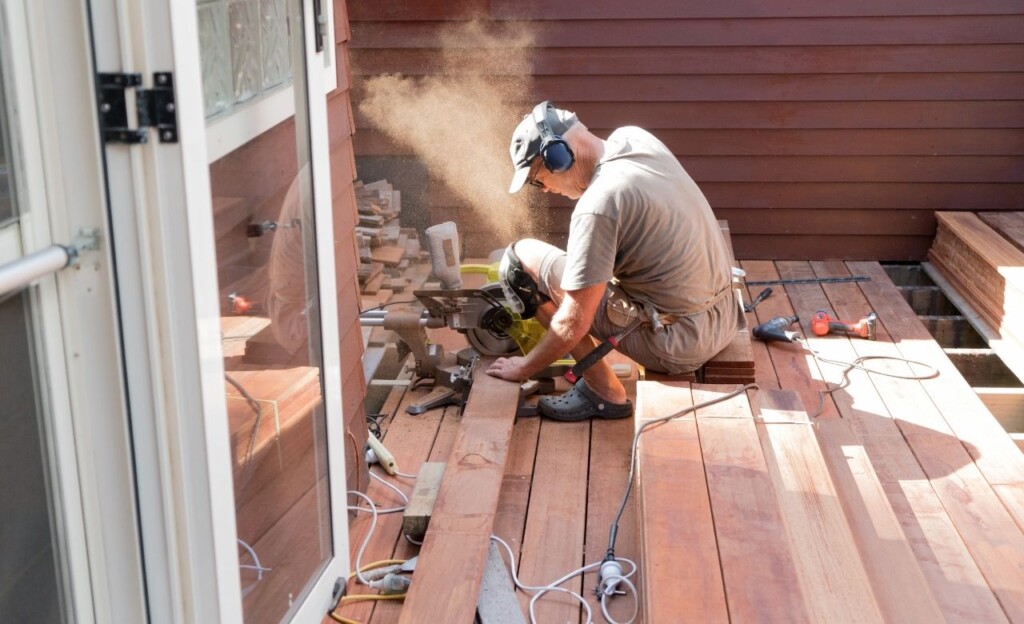
Now you know what to look for. Time to start asking questions.
Ask to see their work. “Show me recent decks you’ve built around here.” If they can’t, keep looking.
Get references. “Can I talk to three customers from this year?” Good contractors hand these over without hesitation.
Ask about materials. “What lumber do you use and why?” They should explain their choices in plain English.
Check their paperwork. “Are you licensed and insured? Can I see proof?” No excuses, no delays.
Talk timelines. “How long will this take? What happens if it rains?” Realistic contractors plan for weather delays.
Understand the warranty. “What’s covered if something goes wrong?” Good contractors explain this clearly and give examples.
Watch how they answer. Do they seem nervous? Evasive? Pushy? Trust your gut.
Ready to talk to a contractor who checks all these boxes? AAA Fence and Deck has been building quality decks in the Triangle for over 30 years. They handle permits, use premium materials, and back their work with solid warranties. Call 984-333-5313 for your free consultation and see why they’re Raleigh’s most trusted deck builders.
Local Raleigh Deck Builders vs Big Contractors: Which Wins?
The deck-building industry has exploded over the past few years. With more homeowners at home, the demand for quality deck construction has increased. When picking a contractor, many homeowners must decide: go with a local family-owned deck builder in Raleigh or a big-name franchise with flashy ads.
This decision is more important than you realize. Your deck is not just an addition; it’s an investment in your property value and your family’s comfort. The contractor you pick will affect the timeline, cost, quality, and your overall experience.
Local vs. Franchise Deck Builders
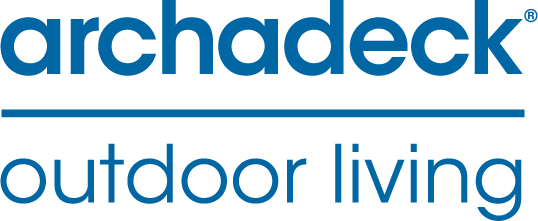
Local deck builders are often family-owned businesses. They serve their communities for years, sometimes decades. These contractors live and work in the neighborhoods where they build decks. They know local suppliers and understand regional weather. They have built relationships with homeowners over time. They help homeowners choose between composite and wood materials in Raleigh. This depends on their needs and budget.
On the other side, you have the big contractors and franchises. Companies like Archadeck and other national brands have big corporate structures. They use standardized processes and large marketing budgets that local builders can’t match. These brands offer consistency and recognition. They rely on corporate resources and structured warranties.
Both types of contractors can build a deck. However, working with them can feel very different.
Advantage #1: Local Expertise and Community Roots
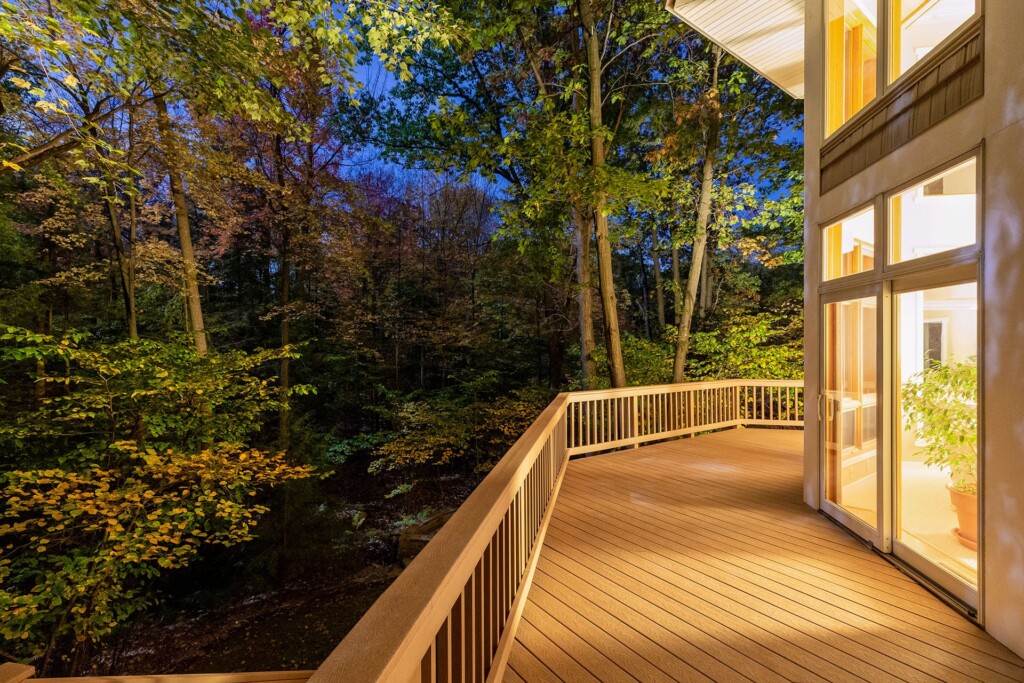
Local deck builders bring knowledge you won’t find in a corporate guide. They understand how North Carolina’s humid summers and winter ice affect different materials, which local lumber suppliers offer the best value, and the ins and outs of Raleigh’s permit requirements and building codes.
Because they’ve worked in your neighborhood, they can spot issues before they become problems—like drainage concerns or soil conditions that affect footings. That experience leads to better planning and a deck built to last in Raleigh’s unique environment.
Local contractors also live and work in the same community as you. Their reputation depends on satisfied customers, so they have every reason to deliver quality work. When your builder shops at the same grocery store or lives just minutes away, accountability becomes part of the service.
Advantage #2: Faster Response and Personalized Service

Hiring a local deck builder in Raleigh means direct, personal service. You’re often talking with the owner or project manager, not a corporate call center.
This direct line makes estimates faster, decisions quicker, and scheduling more flexible. Many local builders provide quotes in days instead of weeks, and they can solve issues on-site without waiting for outside approval.
They also take time to know your preferences and family needs, offering creative suggestions that reflect your vision. It’s a level of service larger companies rarely provide.
Advantage #3: Competitive Pricing and Cost Transparency

Local deck builders often offer better value than franchises because they avoid franchise fees, corporate overhead, and large marketing costs. That means more of your investment goes into quality materials and craftsmanship rather than corporate profits.
They also tend to provide clear, detailed pricing breakdowns—covering materials, labor, and other expenses—so you know exactly what you’re paying for. This transparency makes it easier to compare quotes.
Many local contractors are flexible too. They can suggest different material options to fit your budget or even phase out larger projects. Since decisions are made locally, adjustments are faster and more personalized.
Advantage #4: Craftsmanship and Customization

Local deck builders excel at customization. Without rigid corporate standards, they can adapt to your requests and add creative touches that fit your home.
A Raleigh deck builder might design railings to match your style, work around mature trees, or tackle unique yard layouts—projects big contractors often avoid.
Smaller teams also mean more focus on each build. Instead of rushing to hit quotas, local builders take the time to deliver careful craftsmanship that shows in the details.
Big Contractor Pros and Cons
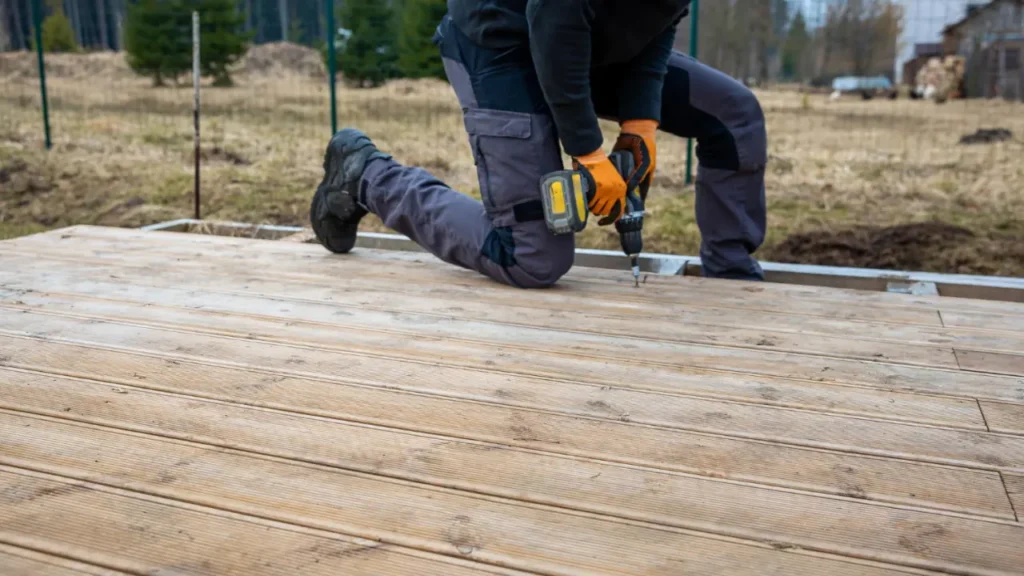
To be fair, large contractors do offer certain advantages. They usually have more resources available. This includes larger crews that can finish projects quickly when needed. Their warranties are often backed by corporate guarantees, which some homeowners find reassuring. They often have strong ties with major suppliers. This can lead to better prices on materials.
But these advantages come with significant drawbacks. Many homeowners report feeling like just another number in a large contractor’s system. Project timelines can be unpredictable as crews get shifted between many jobs. The sales process can feel pushy. Representatives often focus on closing deals instead of understanding your needs.
Communication problems are common with large contractors. Homeowners often talk to different people throughout a project. This can lead to miscommunication and frustration. When problems come up, solving them often means dealing with layers of corporate red tape.
Real Raleigh Reviews: Local Builders vs. Franchises

Many homeowners shared their thoughts on deck projects. One theme stood out: they prefer local builders to large franchise companies. Their stories show why local contractors often win trust.
Sarah from North Hills said, “Our local guy handled HOA and city permits way faster than the big chain. Plus, since he lives nearby, follow-up was easy.” Many agreed that local builders make Raleigh’s complex permitting process much smoother.
Mike, who lives near Lead Mine Elementary School, said, “When you support a local builder, you notice their work around Raleigh. They also care about their reputation.” The big national brands feel anonymous.” Accountability was a common reason homeowners chose locals.
Pricing was another frustration with franchises. Jennifer from Cary said, “The big company’s base price seemed good, but each discussion added ‘necessary’ upgrades. By the end, it was nearly double. Our local contractor gave us one honest price upfront and stuck to it.”
Custom design was also a major difference. Tom from Oakwood noted, “The franchise guy showed us a catalog. The local contractor suggested design touches that matched our 1920s home perfectly.”
Post-construction support showed the sharpest contrast. Homeowners noted that local contractors responded quickly to warranty work. In contrast, franchises were harder to reach for follow-up service.
Across Raleigh, three main reasons kept coming up:
- Personalized service that treats each project uniquely.
- Local expertise that avoids costly delays.
- Community accountability that builds trust.
For many homeowners, these factors make local builders the clear choice.
Making the Right Choice for Your Raleigh Deck

When deciding between local and big contractors for your deck, consider what matters most to you as a homeowner. For personal service and local expertise, choose a Raleigh deck builder like AAA Fence and Deck. You’ll enjoy direct talks with decision-makers and a better overall experience. These contractors have decades of local experience. They are dedicated to customer satisfaction because they are part of the community they serve.
The choice between local and large contractors often comes down to priorities. Homeowners looking for a hands-on, tailored experience usually prefer local builders. People who like corporate structures and brand names may choose larger companies, even with some drawbacks.
Remember that your deck will be part of your home for many years. The bond you form with your contractor can last well beyond the project. This is important, especially if warranty issues or future changes come up.
Frequently Asked Questions About Choosing Deck Builders
Do local deck builders offer warranties like the big companies?
Yes, local deck builders in Raleigh offer warranties on their work. They usually provide more flexible and responsive service than big companies. The main difference is accessibility. When warranty issues come up, local contractors can fix them quickly since they are close by. Their reputation relies on customer satisfaction. Corporate warranties may seem broader, but getting service can involve complex processes.
How do I verify that a local deck builder in Raleigh is properly licensed and insured?
Always ask for proof of licensing, bonding, and insurance from contractors before signing any contracts. Reputable local builders will readily provide this documentation. You can verify licenses through North Carolina's licensing board website. Additionally, check with the Better Business Bureau and read recent customer reviews. Local contractors have served the community for years. They have solid track records that you can easily check.
Will local builders take longer to complete my deck than a big company?
Actually, local builders often complete projects faster than large contractors. Big companies manage many projects in various areas. They might take crews from your job to respond to emergencies. In contrast, local builders use dedicated crews. They have better control over their schedules. They also skip delays from corporate approvals if design changes or issues come up during construction.
What happens if I'm not satisfied with the work of a local contractor?
Local contractors rely on word-of-mouth and community reputation. For them, customer satisfaction is key. Reputable builders will work with you to address concerns quickly and fairly. Before hiring, talk about how they handle disputes. Also, ask about their customer satisfaction approach. Many will return to fix any issues at no extra cost if the work doesn’t meet the agreed-upon standards.
Get Your Free Local Deck Quote
AAA Fence and Deck offers what big contractors can’t: real commitment to your project’s success. They live in your community, understand your local conditions, and stake their reputation on every deck they build.
If you’re ready to explore what a local contractor can offer for your deck project, reach out for a no-pressure consultation. The personal attention, competitive pricing, and local expertise make your choice clear. Your dream deck awaits, and the right local contractor can help you build it exactly the way you envision.
Composite vs Wood Deck: Complete Comparison 2025
A new deck is more than an outdoor upgrade. It’s an investment that helps Raleigh-area homeowners enjoy North Carolina’s sunshine in style. Before you imagine family barbecues or relaxing at sunset, there’s an important choice: composite or wood decking? Each brings its own strengths and quirks, and the right pick can mean years of easy living—or, all too often, surprise repairs and regret.
From Oakwood to Cary, the best deck goes beyond price or looks. It needs to handle Raleigh’s humidity, summer storms, and HOA rules. This guide breaks down every angle: initial cost, ongoing maintenance, lifespan in our local climate, neighborhood requirements, and which deck style nails the look you want. The goal? Clear answers, real numbers, and the confidence to build the backyard of dreams—with zero regrets.
Let’s dig into the knowledge we’ve built building decks for the last 15 years in Raleigh: composite vs wood deck, the complete comparison for North Carolina in 2025.
Composite Decking Overview

Composite decking combines recycled wood fibers and plastics. It merges modern technology with traditional outdoor fun. Top brands in Raleigh, like Trex and TimberTech, provide boards that last longer and work better than natural wood, year after year. These materials are valued for their durability. They resist fading, staining, and wear from the unpredictable North Carolina weather.
The appeal is clear: composite decks need little maintenance. Just rinse them regularly and use a specialty cleaner now and then to keep the boards looking fresh. Colors stay vibrant thanks to UV stability, and there’s no yearly sanding, staining, or sealing. Composite boards are built to resist mold, insects, and warping, which is essential for humid summers and sudden storms. Top brands offer fade and stain warranties lasting 25 to 50 years. This turns maintenance worries into easy, carefree living.
We’ve seen many homeowners in Renaissance Park choose composite means investing upfront. This leads to hassle-free outdoor living, where you can relax instead of repainting.
Wood Decking Overview
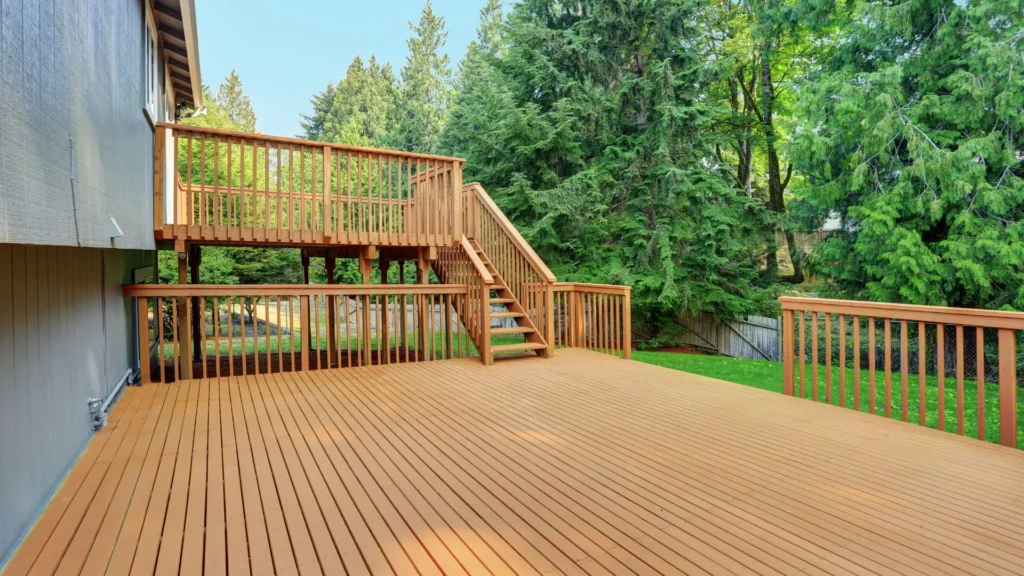
Natural wood decking is a top choice for Raleigh homeowners. Its warmth and timeless look attract many.
The most popular choices are:
- Pressure-treated pine is recognized for its affordability and ease of workability.
- Classic options like cedar and redwood, which offer beautiful colors and naturally resist insects.
Each species has its own charm. Softer pine is great for modest budgets. In contrast, hardwoods like ipe provide luxury and last longer for those willing to invest.
Wood decks are beloved for their traditional look and feel—no two boards are alike, and the real wood grain creates a custom, inviting space. In North Carolina, wood is a popular material. Homeowners love it for its vintage Southern porch charm. It also complements lush, mature landscapes well. There’s unmatched potential for customization through stains and finishes, allowing each homeowner to tailor their deck to match their home’s style and personality.
With wood, a little TLC goes a long way. Regular cleaning, annual sealing, and periodic repairs are essential for managing Raleigh’s humid summers and heavy storms. Real wood is more challenging to care for than composite, but its charm makes it worthwhile. It feels cool, smells nice, and has a classic look. Many people who want a genuine feel in their backyard find this appealing.
Cost Breakdown
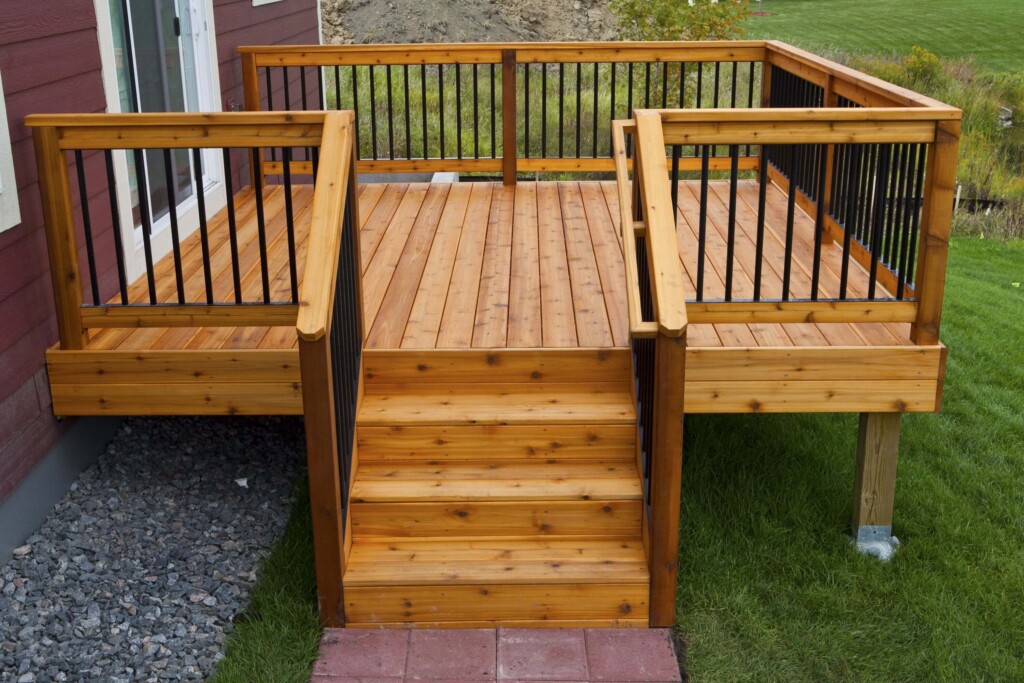
When planning a new deck in Raleigh, cost factors extend well beyond just materials.
Composite decking usually costs more upfront than wood. This cost reflects its strong durability and promise of low maintenance. For this reason we see composite decks installed regularly in Five Points, Hayes Barton, and Oakwood. Wood decks, such as those made from pressure-treated pine or cedar, are initially less expensive. However, they need more care over time.
Labor costs change based on project complexity. Custom designs, multilevel layouts, and features like railings and built-in lighting can raise costs. Site conditions and permits in North Carolina can affect the price. So, it’s wise to get a custom quote from a local expert familiar with Raleigh’s rules and homeowner associations.
Over time, composite and wood decks reveal different cost personalities. Composite costs more to install at first. However, maintenance and repair costs are much lower. By contrast, wood’s lower upfront cost is balanced by regular sealing, staining, and possible board replacements. Investing wisely means considering both short-term and long-term finances. You should also choose a deck that fits your lifestyle and local conditions.
Some contractors make it easy to work with them by offering a price-match guarantee. AAA Fence and Deck has been helping homeowners get the best decks at the best price for years – give him a call today for your free estimate!
Who gets the edge: Composite is more expensive up front. Wood is more expensive long term.
Durability and Lifespan

Composite decking excels in Raleigh’s climate. Even with the humidity and storms material manufacturers warranty it for 25 or 30 years. Composite is a great choice for North Carolina’s weather. It resists decay, insects, fading, and warping. This makes it perfect for steamy summers and rare cold snaps. High-quality composite brands add a protective cap to their boards. This keeps moisture out and keeps color bright for years.
Wood decks are extremely charming and, if treated correctly, they can last a long time. But their lifespan relies on the right materials and good upkeep. Pressure-treated pine typically lasts 10–15 years, cedar up to 20 years, and premium hardwoods even longer with proper care. In Raleigh, the Southern climate challenges natural wood. The hot sun, afternoon storms, and constant humidity can cause rot, splintering, or insect problems if maintenance is ignored. Annual sealing, prompt repairs, and routine inspections are essential to protect the beauty and structure of wood for the long term.
For homeowners in North Carolina, composite seems to be the most popular choice. It lasts long and needs little upkeep in our humid climate. This makes it a durable and low-stress option for your deck. Wood, though, can offer decades of service and unique character, provided it gets the care it deserves.
Who gets the edge: Composite
Appearance and Design Flexibility

Composite decking offers a sleek, modern appearance and can also mimic traditional wood grain. It ensures consistent color and texture across each board. Homeowners can choose from many colors. They can pick cool grays, rich browns, deep charcoals, or warm tans. This variety makes it easy for any deck to match the home’s style. Raleigh’s best composite brands use UV-resistant finishes. These keep colors bright and reduce fading from the strong North Carolina sun. So, composite is a smart choice for anyone wanting a modern, low-maintenance backyard.
Wood decks are celebrated for their authentic, one-of-a-kind beauty. Each plank is unique, with grain pattern, knots, and color variations that give outdoor spaces natural character. Wood decks start with bright colors like honey pine or reddish cedar. Over time, if not finished, they turn a silvery-gray shade. This change happens faster in the strong sun of a Southern summer. Homeowners can easily change the look of a wood deck. They can sand, stain, or paint it. This allows for endless customization options. This makes wood the go-to for those who want creative freedom and value organic warmth.
Ultimately, both materials offer plenty of design flexibility. Composite offers a smooth, consistent look and easy maintenance. Wood, on the other hand, has a unique character and can be customized. This lets homeowners design their deck to fit their changing styles and North Carolina landscapes.
Who gets the edge: Wood Decks (but it’s very close)
Environmental Impact
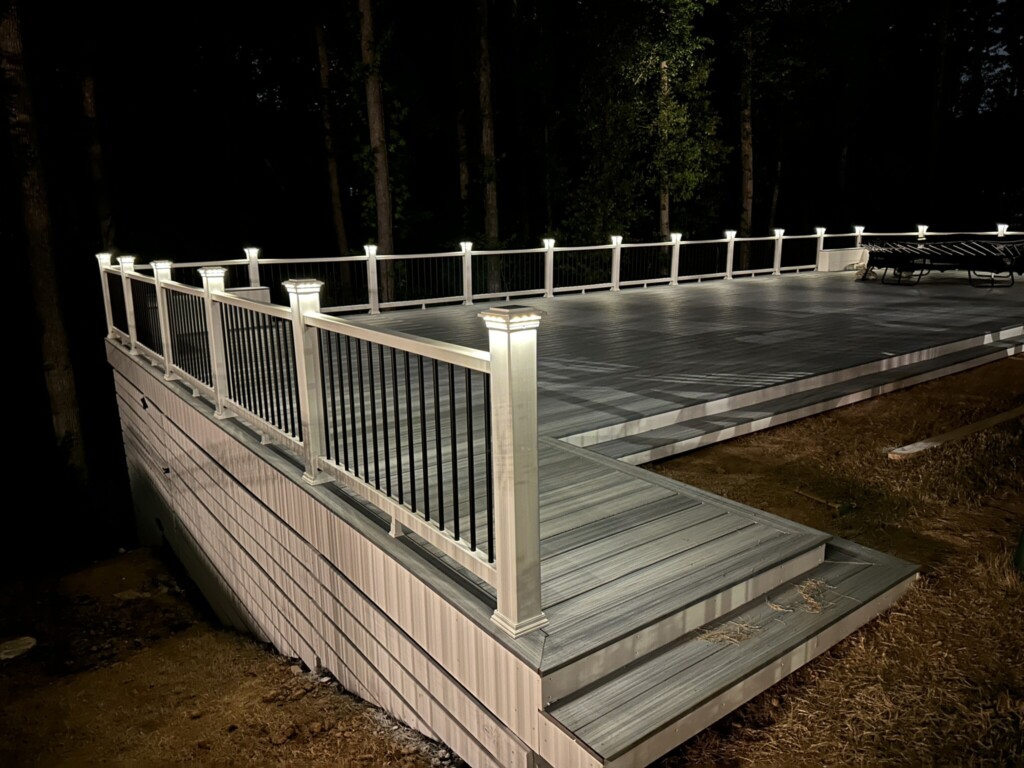
Composite decking steps confidently into the Raleigh sustainability conversation. Many top brands use a lot of recycled plastics and reclaimed wood fibers in their boards. This turns waste into outdoor spaces that can be enjoyed for years. Homeowners can cut landfill waste and reduce the need for new lumber by choosing composite materials. Longer lifespans mean fewer boards are thrown away. Also, the no-stain, no-seal routine avoids harsh chemicals. These chemicals often wash into Carolina soil after summer storms.
Wood, though classic, brings its own set of eco-questions. Responsibly harvested lumber, like FSC-certified pine or cedar, is renewable. It can also be biodegradable when its journey ends. Locally sourced wood has a smaller carbon footprint. This helps support forestry jobs and community green projects. To handle Raleigh’s moisture and sunlight, most wood decks need chemical treatments and regular coatings. These have environmental costs that add up over time. For those prioritizing sustainability, it pays to ask where the wood comes from and how it’s treated.
Either material can be a solid green choice, provided it matches both personal values and regional realities.
Which gets the edge: Composite
Suitability for North Carolina Conditions

Let’s talk about Raleigh specifically. The best material for Raleigh has to endure the humidity, heat, and the occassional freeze. In our opinion, the best fit for this varying challenge is composite decks.
Composite decking uses advanced materials that resist fading, staining, and wear. Its low-absorption surface blocks moisture. Plus, modern UV protection keeps Raleigh’s bright sun from fading vibrant colors. These decks keep their shape and look with little yearly upkeep. This makes them a great choice for homeowners seeking a dependable, long-lasting option for North Carolina’s unpredictable weather.
Wood is still a beautiful and potential option. We will always steer homeowners away from cheaper, untreated options as they simply will not last. However, pressure-treated pine, cedar, and rich hardwoods can do well if sealed properly and mantained every year. The problem is always moisture. Water can get into the grains of the wood and cause it to warp, mold, or even crack. Best practices are regular cleaning, sealing, and spot checks after storms. These steps keep decks strong and beautiful, protecting them from heavy rain and constant sun. Trimmed trees, quick leaf cleanup, and smart placement away from standing water help Raleigh wood decks withstand the elements.
With either choice, local craftsmanship and seasonal care will turn your deck into a weather-tested retreat you’ll enjoy for years.
Which gets the edge: Composite.
Composite vs Wood Decking: Raleigh Head-to-Head
Below is a quick-reference table that captures the big differences (and key similarities) between composite and wood decking for Raleigh homeowners.
| Feature | Composite Decking | Wood Decking |
| Appearance | Consistent color and texture, modern or wood-look | Natural warmth, unique grain, ages to silver patina |
| Maintenance | Hose down and gentle cleaner, no sanding or sealing | Annual cleaning, regular sealing, repairs as needed |
| Durability | Highly resistant to rot, insects, fading, and warping | Vulnerable to rot, splitting, and insects if neglected |
| Lifespan | 25–30+ years with minimal effort | 10–20+ years (depends on type and care) |
| Environmental Impact | High recycled content, long lifespan | Renewable if FSC-certified, biodegradable but needs chemicals |
| Cost Structure | Higher upfront, lower ongoing maintenance | Lower initial, higher long-term maintenance |
| Design Flexibility | Wide range of colors, uniform finish | Unlimited stain/paint options, fully customizable |
| Best for Raleigh? | Low maintenance, reliable, color-stable | Natural charm, for those who love project upkeep |
This side-by-side view makes it easier to match deck choices to real-life priorities and local climate realities.
Ready for your deck installation in Raleigh?
Ready to take the next step toward your dream outdoor space? Call AAA Fence Deck today for a personalized consultation—our Raleigh-based team specializes in designing, permitting, and building decks that fit your style, budget, and HOA requirements. Whether you’re still deciding between composite and wood or want expert advice tailored to North Carolina’s climate, we’re here to turn your vision into a backyard retreat built to last.
FAQ:
How do composite and wood decks compare in terms of cost?
Composite decks generally require a larger upfront investment, but their long-term maintenance expenses are much lower compared to wood. Wooden decks cost less initially, but over time, the need for staining, sealing, and replacement can make the total investment comparable for Raleigh homeowners.
What’s involved in maintaining each type?
Composite decking is prized for its low maintenance—routine cleaning with soap and water keeps it looking fresh. Wood decks, however, need annual cleaning, regular sealing, and monitoring for loose boards or signs of rot to handle Raleigh’s wet summers and fluctuating temperatures.
Which deck lasts longer in our climate?
Homeowners in the Triangle prefer composite for longevity—it typically endures for 25 to 30 years or more, even with minimal attention. Wood can last a decade or two with dedicated care, though premium hardwoods fare better. The difference comes down to upkeep, local weather, and material quality.
Are composite or wood decks better for the environment?
Many composites are made from recycled materials, offering a sustainable solution with a long lifespan and fewer chemical treatments. If using wood, choose certified, responsibly harvested lumber and be mindful of treatments that impact local ecosystems.
How long does installation take?
A typical deck build in Raleigh can take from one to three weeks, depending on factors like weather, project complexity, and permitting. Fast approvals and clear plans can speed up the timeline, whether you opt for composite or wood.
Should You Repair or Replace Your Raleigh Deck? Expert Guide
Your deck serves as the bridge between indoor comfort and outdoor living, especially here in Raleigh, where mild seasons invite year-round entertaining. But when boards start showing their age or railings feel loose under your grip, you face a homeowner’s dilemma: repair what you have or start fresh?
Weather patterns unique to central North Carolina, local pest pressures, and fluctuating material costs all influence whether patching up problems makes financial sense or if replacement offers better long-term value. This guide from a deck-building expert in Raleigh,NC will help you to decide.
How Raleigh’s Climate Tests Your Deck
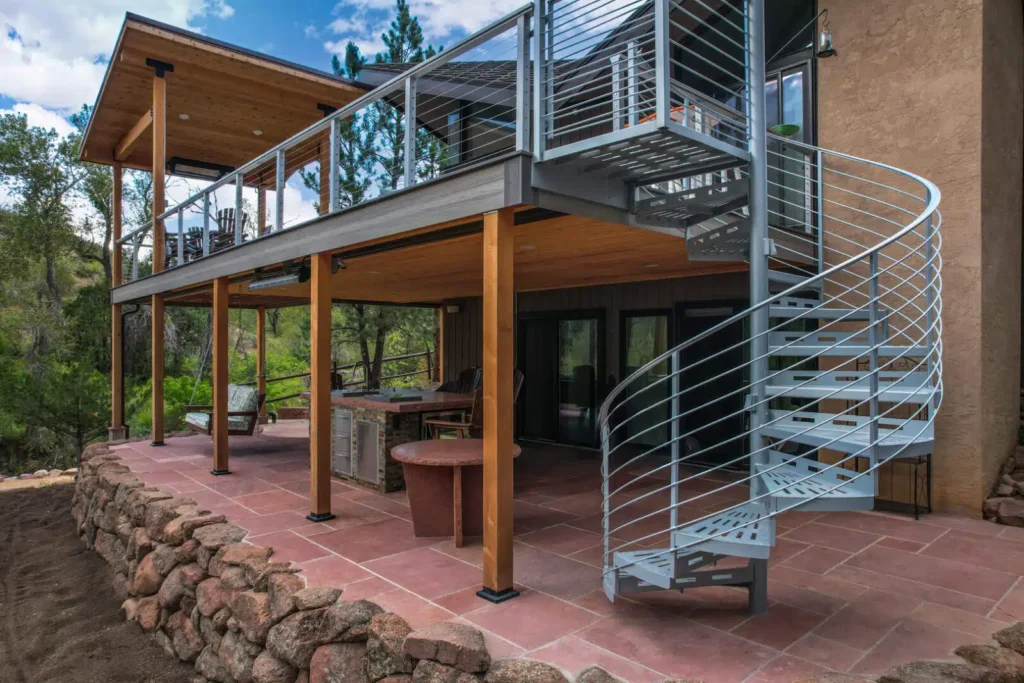
Living in the Triangle means your outdoor structures face specific challenges that homeowners in drier climates rarely encounter.
Moisture and Humidity
Summer humidity regularly pushes past 70%, creating perfect conditions for wood rot and mold growth. When afternoon thunderstorms dump an inch of rain in thirty minutes, water finds every small gap between boards and lingers in joints where air circulation stays poor. How different materials handle Raleigh’s weather patterns can significantly influence your repair-versus-replace decision.
Properties near water features like Lake Anne face additional moisture challenges. Homeowners along W Lake Anne Dr and Hillside Dr often report faster wood degradation compared to properties in drier neighborhoods.
Temperature Swings
January mornings might start at 28 degrees before climbing to 55 by afternoon. These freeze-thaw cycles cause fasteners to work loose as wood expands and contracts. Metal hardware corrodes faster when moisture freezes, then melts repeatedly throughout winter months.
Local Pest Pressure
Subterranean termites thrive in our clay soil and humid conditions. They often target deck support posts and joists first, where wood stays damp longest. Carpenter ants also favor moisture-damaged wood.
UV Intensity
Summer sun delivers punishing UV exposure. Deck stain fades faster, and unprotected wood fibers break down more quickly than manufacturer warranties suggest.
When Do You Need a Repair

Several common issues respond well to targeted fixes that extend your deck’s useful life by years.
Surface-Level Problems
Loose boards that still feel solid underfoot often just need new fasteners. If the underlying joists remain straight and strong, re-securing deck boards costs a fraction of full replacement.
Cosmetic Wear
Fading, surface scratches, and weathered appearance respond well to deep cleaning followed by fresh stain or sealant. Before starting any major renovation project, check if you need permits for your deck work to avoid delays or code violations.
Minor Railing Issues
Wobbly railings frequently stem from loose bolts or worn hardware rather than fundamental design problems. Replacing balusters, tightening connections, or adding reinforcement brackets often restores safety and stability.
Isolated Damage
A few damaged boards among dozens of healthy ones, or small sections affected by planter overflow or grill grease, typically warrant spot repairs rather than wholesale replacement.
Cost Parameters In Raleigh’s current market, basic board replacement runs $8-12 per square foot for pressure-treated lumber, while railing repairs average $15-25 per linear foot. When repair costs stay below 40% of replacement value, fixes usually make financial sense.
Problems That Demand Replacement
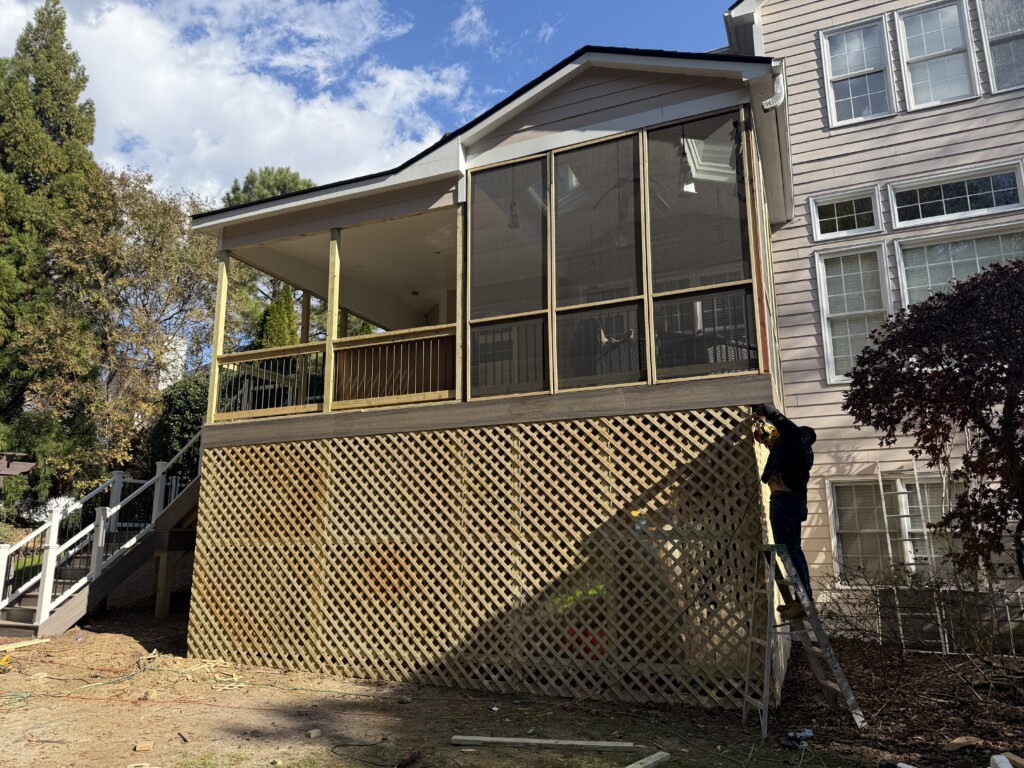
Some problems signal that repairs will only delay inevitable replacement while potentially compromising safety.
Structural Deterioration
When deck joists feel soft or spongy underfoot, the supporting framework has likely suffered extensive moisture damage. Attempting repairs on compromised structural members creates ongoing safety risks and rarely proves cost-effective.
Widespread Rot
If more than 25% of visible deck boards show signs of rot, decay has likely spread to less visible structural components. This becomes especially common in Raleigh after several seasons of inadequate sealing combined with our heavy rainfall.
Foundation Issues
Problems with ledger boards, support posts, or footings require immediate attention. These elements carry the entire deck’s weight, and failure can cause catastrophic collapse.
Extensive Pest Damage
Active termite infestations or widespread carpenter ant damage affecting load-bearing members usually mean that replacement offers the only permanent fix.
Code Compliance
Older decks may lack proper flashing, adequate fastening, or meet current height and spacing requirements for railings. When selling your home or filing insurance claims, non-compliant structures can create legal and financial complications.
Selecting Replacement Materials

If replacement makes the most sense, choosing appropriate materials for Raleigh’s climate can significantly impact long-term satisfaction and maintenance requirements.
Pressure-Treated Pine: The most budget-friendly option handles moisture better than untreated lumber but still requires regular maintenance. Plan on cleaning and re-staining every 2-3 years to prevent premature weathering.
Composite Decking: Engineered materials resist rot, insects, and fading while requiring minimal maintenance. However, these surfaces can become uncomfortably hot during Raleigh’s summer months, making bare-foot use challenging on sunny days. Many homeowners address this by adding pergolas, awnings, or strategically placed shade structures.
Cedar and Hardwoods: Natural resistance to moisture and insects makes cedar an attractive middle-ground option. Cedar stays cooler underfoot than composite materials, making it more comfortable during hot weather.
Climate Considerations: Raleigh’s humidity and temperature fluctuations favor materials with good dimensional stability. When switching from wood to composite, additional joist reinforcement may be required due to the heavier weight and stricter spacing requirements of composite materials.
Making the Final Decision

Several factors should guide your repair-versus-replace choice, with safety and long-term economics taking priority over short-term cost savings.
Safety Assessment
Any structural concerns should tip the scale toward replacement. Compromised load-bearing members, loose railings, or deteriorated foundations pose serious risks that repairs might not adequately address.
Financial Analysis
When repair costs exceed 50% of replacement value, new construction usually makes more sense. Many Raleigh homeowners who’ve switched from wood to composite report that, despite higher initial costs, the reduced maintenance burden and longer lifespan make financial sense over time.
Timeline Considerations
Repairs can often be completed in days, while replacement projects may take weeks.
Professional Assessment
A qualified contractor familiar with local building codes can identify problems you might miss and provide realistic cost estimates for both options.
Moving Forward

Minor cosmetic issues, isolated damage, and surface-level problems typically respond well to targeted repairs. However, structural concerns, widespread deterioration, or extensive pest damage usually signal that replacement offers better long-term value and safety.
In Raleigh’s challenging climate, properly maintained decks can provide decades of enjoyment, while neglected structures deteriorate rapidly. Whether you choose repair or replacement, addressing problems promptly prevents minor issues from becoming major expenses.
If you remain uncertain about your deck’s condition or the most appropriate course of action, AAA Fence and Deck can provide a professional assessment and honest recommendations.
Frequently Asked Questions
What time of year is best for deck repair or replacement in Raleigh?
Late fall through early spring offers the best conditions for deck work in Raleigh. Lower humidity levels help materials acclimate properly, and you'll avoid the peak thunderstorm season.
Do composite decks really get too hot to walk on in Raleigh summers?
Yes, composite decking can become uncomfortably hot under direct sunlight during Raleigh's summer months, often reaching temperatures that make bare-foot use painful. Wood decking stays cooler but requires more maintenance.
How can I tell if my deck's foundation is failing?
Look for wobbly posts, cracks in concrete footings, or gaps where the ledger board meets your house. If the deck bounces excessively when walked on, or if you notice the deck pulling away from the house, these indicate serious foundation problems.
Should I repair my deck myself or hire a professional?
Simple cosmetic repairs like cleaning, staining, or replacing individual boards can often be DIY projects. However, structural repairs, electrical work, or anything affecting safety should be left to licensed professionals.
Ready to Make the Right Choice for Your Deck?
Don’t let uncertainty keep you from enjoying your outdoor space safely. Whether your Raleigh deck needs simple repairs or complete replacement, making the right decision starts with a professional assessment.
Contact AAA Fence and Deck today at (984) 333-5313 for a free consultation. Our experienced team will evaluate your deck’s condition, explain your options clearly, and provide honest recommendations that fit your budget and timeline.Visit us at 5306 Creedmoor Road, Raleigh, NC 27612 or email contact@aaafencedeck.com to schedule your no-obligation deck inspection.
Raleigh Deck Permits: What You Actually Need
Building a deck in Raleigh should be fun, not a headache. But many homeowners get stuck when city inspectors show up with stop-work orders. Why? They’re missing the right permits.
Permits aren’t just red tape. They protect you from fines, legal trouble, and problems when you sell your house. Most deck projects in Wake County need permits, but the process is manageable when you know what to expect.
Here’s everything homeowners need to know about deck permits and practical tips from a reputable deck builder in Raleigh for hassle-free projects. Whether you’re planning a simple deck or something big enough to rival the holiday displays at the Heindel House on Sleepy Creel Dr and Wellsley Way, the permit rules are the same. Let’s break it down simply.
Do You Really Need a Deck Permit in Raleigh?

Yes, you probably do. Since Raleigh changed its rules in 2020, almost all deck projects need permits. This includes attached decks, standalone decks, and anything that needs footings or posts in the ground.
The only time you don’t need a permit is for small repairs like replacing deck boards on an already-permitted deck. However, knowing when to repair versus replace your Raleigh deck can save you significant time and money in the permit process. Building anything new usually means getting a permit first.
Skipping permits causes real problems. City inspectors can stop your work immediately. You’ll face fines starting around $500 that go up fast. When you try to sell your house later, buyers might walk away or demand you fix everything properly.
Your insurance company might not cover damage from unpermitted decks either. That’s a risk most homeowners can’t afford.
You’ll also need a property survey for most permits. This adds $300 to $600 to your costs, but it shows the city exactly where your deck sits on your lot.
The Step-by-Step Permit Process
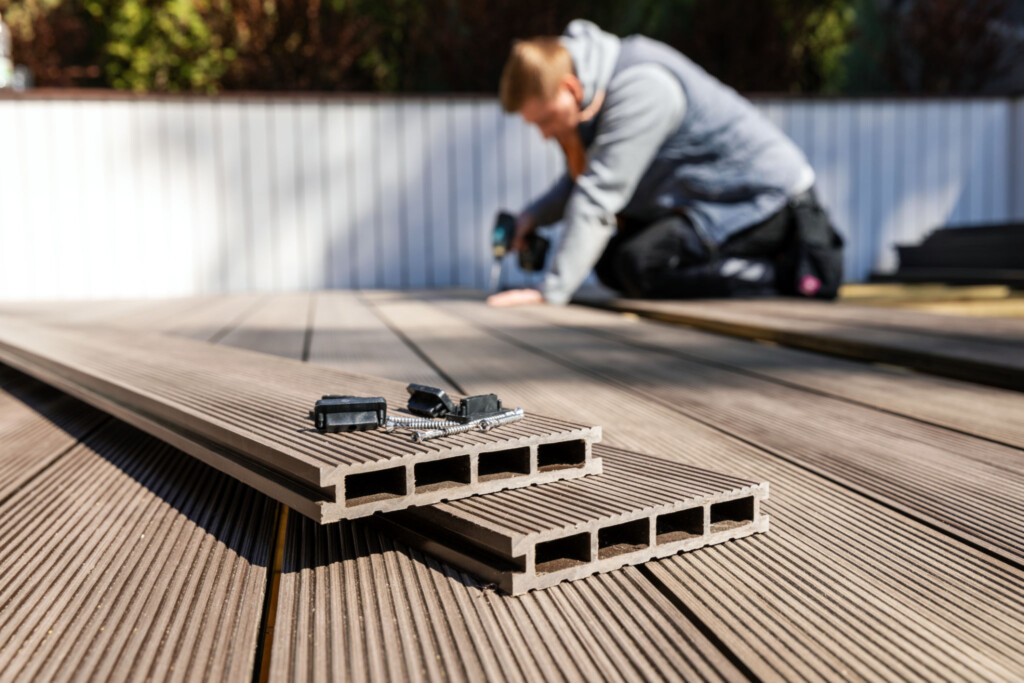
Getting a deck permit in Wake County follows a clear process, though timing depends on how busy they are and how complex your deck is.
First, gather your project details. You need drawings showing deck size, materials, and how it connects to your house. You also need to show property lines and how far your deck sits from them. Good drawings cost extra but make approval much faster.
Submit your application online through Wake County’s website or visit their office at 336 Fayetteville St # 500, Raleigh, NC 27601. Online usually works faster and lets you check on progress anytime. Make sure you include everything they ask for upfront. Missing paperwork means starting over.
Plan review takes one to three weeks for normal decks. Fancy designs or special properties take longer. They check that your deck is safe and follows all the rules.
Once approved, you can schedule inspections. Wake County requires several: one for footings before you pour concrete, one for framing before you put decking down, and one final check before you can use your deck. Missing any inspection means stopping work until you reschedule.
What Will This Cost You?
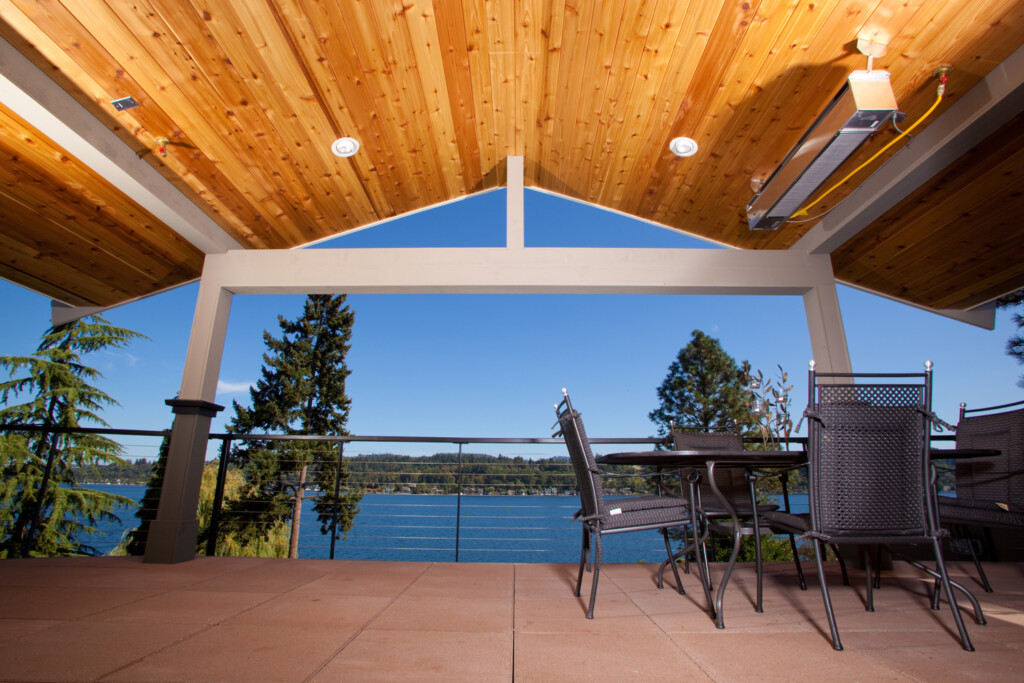
Basic deck permits in Wake County start around $75 for smaller decks. Bigger decks can cost $200 to $400 just for permits.
But that’s not the whole story. For complex projects involving multiple permits or HOA approvals, understanding the full scope early prevents delays that compound throughout your timeline. Property surveys add $300 to $600. If your plans need changes, expect to pay $75 each time you revise them. Failed inspections cost $60 to redo.
Professional drawings run $300 to $800, depending on your deck’s complexity. This seems expensive, but good drawings prevent costly revision cycles. Many contractors include basic drawings in their price, but always ask what’s covered.
If your deck costs more than $10,000, you’ll pay extra fees based on the total project value. These can surprise homeowners who only budgeted for basic permit costs.
Dealing With Your HOA
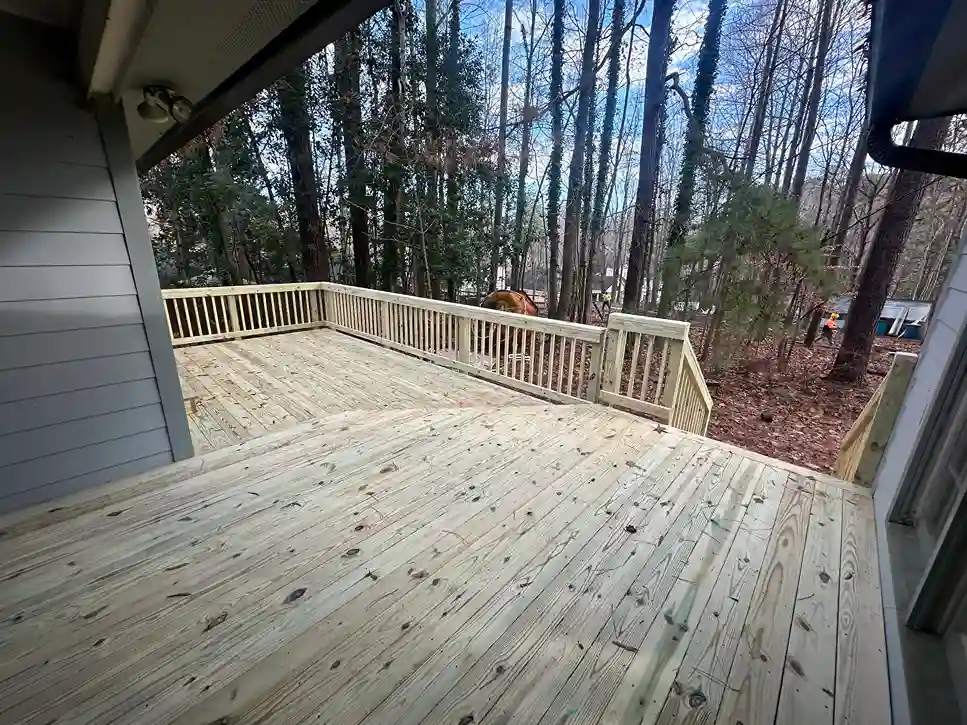
Homeowner associations add another layer of approval that works separately from city permits. Many Raleigh neighborhoods have strict rules about what decks can look like.
HOA rules often go beyond city requirements. Your HOA might reject deck designs that the city would approve. Some require certain materials, colors, or styles that match the neighborhood’s look.
Timing gets tricky here. HOA committees often meet once a month, adding four to eight weeks to your timeline. Some homeowners get city permits first, then get stuck when their HOA says no to the same plans.
Start your HOA approval process early, before you submit city permits. This prevents situations where you have useless city permits because your HOA wants changes.
Simple Tips to Avoid Problems
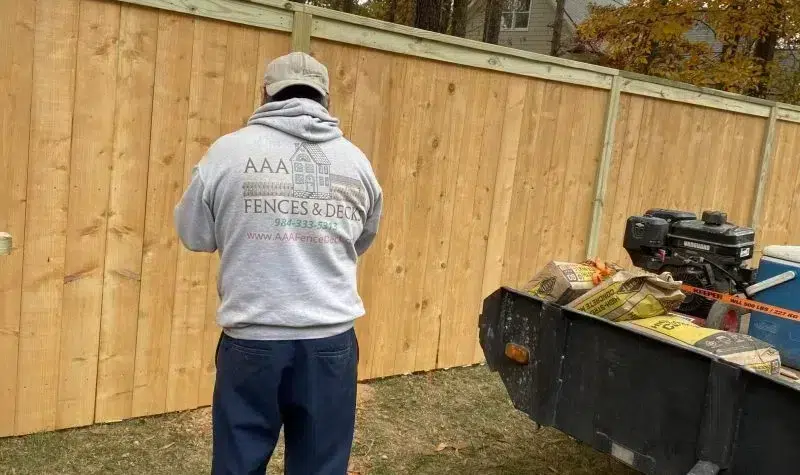
Call Wake County’s permitting office before hiring anyone. They can tell you exactly what your project needs. Visiting in person often gets faster answers than phone calls.
Pick contractors who know local permit rules. Licensed pros should handle permits smoothly, but make sure they understand Wake County’s specific requirements. Some contractors from other areas struggle with local rules.
When contractors say they’ll “handle all permits,” ask for copies of everything they submit. Some skip the actual paperwork while promising to handle it. You’re still responsible no matter what they promise.
Keep all permit documents forever. Future home sales, insurance claims, and other projects might need this paperwork. Save digital copies in multiple places.
Think about timing when planning your project. Spring and summer are busy times that can slow down approvals. Winter applications often go faster, though weather might delay building.
Include permit costs in your budget early. Last-minute permit discoveries can blow your budget when you’re already spending on materials and labor.
Moving Forward With Your Deck Project

Deck permits might seem like a hassle, but they actually protect your investment. Permitted decks are easier to sell, insure better, and give you peace of mind that everything is built safely.
The permit process in Wake County goes smoothly when you understand what’s needed upfront and work with experienced contractors. Most homeowners find the paperwork less scary than they expected.
Before starting your Raleigh deck project, spend an hour talking to Wake County’s permitting office. That small time investment can save weeks of delays, hundreds in fees, and lots of stress dealing with city officials.
Your future self will thank you when neighbors admire your new deck while you relax knowing everything was done right from the start. AAA Fence and Deck has helped hundreds of Raleigh homeowners through this process, making permits work for the project instead of against it.
Frequently Asked Questions About Raleigh Deck Permits
Can I start building my deck while waiting for permit approval?
No, you cannot start construction until Wake County officially approves your permit. Starting early risks stop-work orders, fines, and possibly tearing down finished work. Wait for approval before breaking ground.
What happens if I build a deck without a permit in Raleigh?
Building without permits can result in stop-work orders, fines starting at $500, and requirements to get permits after the fact. You may need to expose finished work for inspections or rebuild parts that don't meet code. Unpermitted work also creates problems when selling your home and with insurance.
Do I need a property survey for my Raleigh deck permit?
Most deck permits in Wake County require a current property survey to verify boundaries and setback rules. If you don't have a recent survey, you'll need to get a new one. The permitting office may reject old surveys, especially if you've made changes to your property since then.
Can my contractor pull the permit, or do I need to do it myself?
Licensed contractors can apply for permits for you, and many homeowners prefer this since contractors know the submission requirements. However, you're still legally responsible for permit compliance no matter who applies. Always ask for copies of submitted documents and approval letters.
Ready to Build Your Dream Deck the Right Way?
Don’t let permit confusion delay your deck plans. Whether you’re planning a simple deck or an elaborate design, getting permits right from the start saves time, money, and headaches.
Call AAA Fence and Deck today at (984) 333-5313 for a free consultation. Our team handles all permit requirements, HOA coordination, and construction details so you can focus on planning your first cookout. Let us build your deck vision while keeping everything properly permitted and up to code.
Composite vs Wood Decks: Raleigh Weather Guide
Your deck faces a daily battle against North Carolina’s weather extremes. Raleigh’s humid summers, surprise thunderstorms, and temperature swings that can shift 40 degrees in a single day create unique challenges for outdoor materials. The choice between composite and wood decking is no longer just about aesthetics or budget. It’s about survival.
Homeowners often make this decision based on initial cost alone, only to discover years later that maintenance expenses tell a different story. The climate here demands materials that can handle moisture, resist mold, and bounce back from whatever Mother Nature throws at them. This article draws on insights from experienced deck builders in Raleigh to help you decide what’s best for you and your decking needs.
Understanding Your Decking Options

Composite Decking Basics
Composite materials combine wood fibers with plastic polymers, creating a hybrid that borrows the best qualities from both materials. These boards resist moisture penetration while maintaining a wood-like appearance. Modern composites come in dozens of colors and textures, some so realistic they fool even experienced contractors.
The manufacturing process involves heating recycled materials to create boards that won’t splinter, warp, or crack like traditional lumber. Most composite manufacturers offer warranties ranging from 20 to 30 years, reflecting their confidence in the material’s durability.
Wood Decking Fundamentals
Natural wood brings an authentic warmth that many homeowners crave. Cedar, pressure-treated pine, and exotic hardwoods each offer distinct characteristics. Wood accepts stains beautifully, allowing for complete customization of color and finish. The upfront cost runs lower than composite options, making wood attractive for budget-conscious projects.
However, wood remains a living material even after it is installed. It expands and contracts with humidity changes, absorbs moisture, and provides food for insects and fungi.
How Raleigh Weather Tests Your Deck
The Research Triangle region presents a perfect storm of conditions that can damage decks. Summer humidity levels regularly exceed 80%, creating an environment where mold and mildew thrive. Spring and fall bring heavy rains that can dump several inches in just hours. Winter freeze-thaw cycles cause materials to expand and contract repeatedly.
UV radiation peaks during summer months, breaking down wood fibers and fading stains. The combination of heat and moisture accelerates decay in organic materials. Even the best-maintained wood deck faces these challenges every day.
Before you start planning your project, understanding what you need for deck permits in Raleigh can save you time and headaches down the road.
Composite materials handle these conditions differently. The plastic component repels water while the wood fibers provide stability. Most quality composites include UV inhibitors that prevent color fading and material breakdown.
Maintenance Reality Check

Composite Maintenance Requirements
Composite decks need occasional cleaning to remove pollen, leaves, and general grime. A garden hose and mild soap handle most cleaning tasks. Stubborn stains from grease or wine might require specialized cleaners, but these situations arise infrequently.
Homeowners who have made the switch consistently report satisfaction with the simple cleaning routine. Many forum discussions highlight the relief of eliminating splinters and avoiding the constant worry about fading and weather damage that comes with wood decking.
The biggest maintenance task involves clearing debris from between boards to prevent water pooling. Annual inspections should check for loose fasteners or damaged boards, though these issues occur rarely with quality installations.
Wood Maintenance Demands
Wood decks require active maintenance to survive different climates. The cleaning, sealing, and staining cycle repeats every two to three years. Skipping this schedule leads to rapid deterioration, especially with pressure-treated lumber.
Spring maintenance involves pressure washing to remove winter grime and mildew. Summer inspections look for loose boards, protruding nails, and early signs of rot. Fall preparation includes cleaning gutters and ensuring proper drainage around the deck structure.
The time investment adds up quickly. Most homeowners spend 8-12 hours annually maintaining a standard-sized wood deck. This doesn’t include emergency repairs after storms or addressing pest damage.
Long-Term Financial Picture

Initial material costs tell only part of the financial story. Wood decking materials might cost 30-40% less upfront, but maintenance expenses accumulate over time. Professional deck cleaning and staining services in Raleigh charge per square foot, and rates may vary annually.
Composite materials often cost 50% or more than wood initially. However, take note that consistent wood maintenance costs offset this premium over time. One common sentiment from local homeowners: pressure-treated wood “looks like crap in 5 years” without rigorous upkeep in our humid climate.
Composite decking requires a larger initial investment but eliminates ongoing maintenance costs. The break-even point occurs around year seven for most homeowners. After that, composite becomes the more economical choice.
We observed that homeowners who choose composite materials spend significantly less time and money on deck maintenance over the long term. This frees up weekends for enjoying outdoor spaces rather than working on them.
Resale value considerations favor composite materials in the market. Home buyers appreciate low-maintenance features, especially in our climate. Real estate professionals report that well-maintained composite decks add more value than aging wood decks requiring immediate attention.
Climate-Specific Performance

Moisture Management
Raleigh receives approximately 46 inches of rainfall annually, with summer thunderstorms delivering intense downpours. Wood naturally absorbs moisture, leading to swelling, cupping, and eventual rot. Even properly sealed wood shows moisture damage after several seasons.
Composite materials shed water effectively, preventing the moisture-related problems that plague wood decks. The plastic component creates a barrier that keeps water on the surface rather than allowing penetration into the board structure.
Heat Retention Concerns
Early composite materials earned a reputation for becoming uncomfortably hot in direct sunlight. Modern formulations address this issue through improved manufacturing techniques and lighter color options. Many newer composites remain cooler than traditional wood decking on sunny days.
Composite decks can also become uncomfortable for bare feet during intense summer heat. It is recommended to use outdoor rugs in high-traffic areas or add shade structures to mitigate the temperature issue.
Color choice matters significantly for heat management. Darker composite boards absorb more heat than lighter alternatives. Gray and tan colors offer a good compromise between aesthetics and temperature control.
Mold and Mildew Resistance
High humidity creates perfect conditions for mold and mildew growth on organic materials. Wood decks in shaded areas often develop black stains and slippery surfaces from these organisms. Regular cleaning helps, but the problem returns quickly without constant attention.
Composite materials resist mold and mildew growth naturally. The plastic content prevents organisms from establishing permanent colonies on the surface. When growth does occur, simple cleaning removes it completely without staining or damage.
Professional Recommendations for the Raleigh Area

AAA Fence and Deck recommends composite materials for installations. From neighborhoods near the Little Free Library in Breckenridge to homes around Hilburn Dr and Sprague Rd., the climate here accelerates wood deterioration beyond what many homeowners expect. Composite decking provides predictable performance regardless of weather conditions.
We emphasize the importance of hiring licensed deck builders, particularly those who handle permitting requirements. This becomes especially important with composite installations that need proper substructure support to prevent future problems. Permit processes have become more complex but remain worthwhile for peace of mind.
TimberTech and Trex represent the most popular composite brands in this market. Both companies engineer their products specifically for southeastern climates. Their warranty coverage reflects confidence in long-term performance under challenging conditions.
For homeowners committed to wood decking, cedar offers better natural resistance to moisture and insects than pressure-treated pine. However, cedar costs significantly more upfront and still requires regular maintenance to perform well in our climate.
Making Your Decision

Several factors should influence your material choice beyond initial cost. Consider your available time for maintenance, long-term housing plans, and personal preferences for aesthetics. Families with young children often prefer composite materials for their splinter-free surfaces and low maintenance requirements.
Think about your outdoor lifestyle, too. Active households that use their decks frequently benefit from composite durability and easy cleaning. Those who enjoy woodworking and don’t mind regular maintenance might prefer wood’s natural beauty and customization options.
The local climate gives composite materials a clear performance advantage in Raleigh. While wood can perform adequately with diligent maintenance, composite decking provides worry-free outdoor enjoyment regardless of weather conditions.
Your deck represents a significant investment in your home’s outdoor living space. Choosing materials that match both your climate and lifestyle ensures years of satisfaction with your decision. Take time to evaluate all factors before committing to either option, but remember that in a challenging climate, composite materials offer the most predictable long-term performance.
Frequently Asked Questions
How much maintenance do wood decks require?
Wood decks need cleaning, sealing, and staining every 2-3 years in Raleigh's climate. This involves 8-12 hours of annual maintenance plus ongoing repairs for loose boards, protruding nails, and weather damage. Neglecting this schedule leads to rapid deterioration.
Are composite decks hotter than wood in North Carolina summers?
Modern composite materials have improved significantly regarding heat retention. While early products became uncomfortably hot, newer formulations with lighter colors often stay cooler than wood decking in direct sunlight.
Do local building codes favor certain decking materials?
Building codes don't specify decking materials, but they do require proper permits and inspections. Both wood and composite materials meet local requirements when installed correctly by licensed contractors.
Can you repair deck sections after storm damage?
Both materials can be repaired, but the process differs. Wood repairs often involve replacing individual boards or sections, which is relatively straightforward. Composite repairs require manufacturer-specific replacement boards and may need professional installation to maintain warranty coverage.
Key Questions When Hiring Deck Builders in Northwest Raleigh
Building a deck is one of the most rewarding home improvement projects you can undertake, transforming your outdoor space into a beautiful extension of your home. However, choosing the right deck builder in Northwest Raleigh can make the difference between a stunning addition that enhances your property value and a costly headache that leaves you disappointed. For homeowners in Northwest Raleigh, this decision carries even more weight due to unique local considerations, including specific building codes, climate challenges, and neighborhood aesthetics.
This area presents distinct opportunities and challenges for deck construction. From the Prairie Road Ecosystem’s natural beauty to the established neighborhoods along Edwards Mill Road and the developing areas near Reedy Creek Road, the mix of mature communities and new developments means builders must navigate varying HOA requirements. North Carolina’s humid subtropical climate demands materials and construction techniques that can withstand significant temperature fluctuations, heavy rainfall, and occasional severe weather. Additionally, the region’s clay soil conditions can impact foundation work and drainage considerations for deck installations.
To help you make an informed decision and ensure your deck project exceeds expectations, here are the essential questions every area homeowner should ask potential deck builders.
10 Questions to Ask Before Hiring a Deck Builder
1. What Experience Do You Have With Decks in Northwest Raleigh?

Local experience matters tremendously when it comes to deck construction. This area’s unique climate patterns, soil conditions, and building requirements create specific challenges that experienced local builders know how to navigate effectively.
A seasoned local deck builder will understand the region’s heavy clay soil and how it affects drainage around deck foundations. They’ll be familiar with the area’s frequent summer thunderstorms and know which materials and construction techniques best withstand high humidity and occasional severe weather. Most importantly, they’ll have established relationships with local suppliers, inspectors, and permitting offices, which can streamline your project timeline.
Ask potential builders for specific examples of recent projects in neighborhoods along Edwards Mill Road, near Reedy Creek Road, or around the Prairie Road Ecosystem area. Request details about challenges they encountered and how they addressed them. A builder with genuine local experience will be able to discuss specific neighborhoods like North Hills and Crabtree Valley, common soil issues they’ve encountered, and how they’ve adapted their construction methods to local conditions.
2. Are You Licensed and Insured?

This question is non-negotiable and should be among the first things you verify with any potential deck builder. In North Carolina, contractors performing work valued over $30,000 must hold a general contractor’s license, while smaller projects may require specific specialty licenses depending on the scope of work.
Your deck builder should carry both general liability insurance and workers’ compensation insurance. General liability protects you if someone is injured on your property during construction or if your property is damaged during the project. Workers’ compensation ensures that if a worker is injured on your property, you won’t be held liable for medical expenses or lost wages.
Don’t simply take their word for it – ask to see current certificates of insurance and verify the license number with the North Carolina Licensing Board for General Contractors. A reputable builder will provide this information readily and without hesitation. If a contractor seems reluctant to share licensing and insurance information, or claims they don’t need it for your project, consider this a significant red flag.
3. Can You Provide References or a Portfolio of Past Work?

A quality deck builder should be proud to showcase their work and connect you with satisfied customers. Ask for references from recent projects, ideally within the past year and preferably in Northwest Raleigh or similar areas. A portfolio of completed projects will give you insight into their craftsmanship, attention to detail, and design capabilities.
When contacting references, ask specific questions about the builder’s communication, adherence to timelines, cleanliness of the job site, and how they handled any unexpected issues. Inquire about the quality of materials used and whether the final result met or exceeded expectations. Also ask if they would hire the same builder again for future projects.
If possible, ask to visit completed projects in person, particularly those in similar neighborhoods along Edwards Mill Road or near the Prairie Road Ecosystem. Photos can be misleading, and seeing the work firsthand allows you to assess build quality, attention to detail, and how the deck has weathered over time. Pay attention to details like consistent spacing between deck boards, quality of railings and balusters, and overall structural integrity.
4. What Design Options and Materials Do You Offer?

The material choice for your deck significantly impacts both its appearance and longevity. This area’s climate presents unique challenges that make material selection crucial for long-term satisfaction with your investment.
Pressure-treated lumber remains popular due to its affordability and natural appearance, but it requires regular maintenance, including staining or sealing every 2-3 years. Cedar offers natural resistance to insects and decay but comes at a higher initial cost. Composite decking, made from recycled wood fibers and plastic, offers low maintenance and excellent durability but requires a larger upfront investment.
A knowledgeable builder should be able to explain the pros and cons of each material option specific to the local climate. They should discuss how different materials perform in high humidity, how they handle temperature fluctuations, and what maintenance requirements you can expect. For detailed guidance on keeping your deck in optimal condition, check out our essential deck maintenance tips for Northwest Raleigh homeowners.
Additionally, they should be able to show you samples and discuss color options, textures, and how different materials will complement your home’s architecture.
The design process should be collaborative, with the builder listening to your vision while offering professional guidance on practical considerations like traffic flow, privacy, and integration with your existing landscape. Ask about their design process – do they provide detailed drawings or 3D renderings? How do they handle revisions to the initial design?
5. What Is the Estimated Timeline and Process?

Understanding the project timeline helps you plan accordingly and sets realistic expectations for completion. Deck construction timelines can vary significantly based on size, complexity, weather conditions, and permit approval times.
A typical deck project in this area might follow this general timeline: initial consultation and design (1-2 weeks), permitting (2-4 weeks), material ordering and delivery (1-2 weeks), and construction (3-7 days for most residential decks). However, these timelines can be affected by weather delays, permit approval times, and material availability.
Ask your builder to walk you through their process from initial consultation to project completion. How do they handle communication during the project? Will you have a dedicated project manager or point of contact? What happens if the weather delays construction? Understanding these details upfront helps prevent misunderstandings and ensures smooth project execution.
Also, inquire about their typical workday schedule and how they manage job site cleanliness. Will they clean up daily, or only at project completion? These details might seem minor, but they significantly impact your daily life during construction.
6. How Do You Handle Permitting and Inspections?
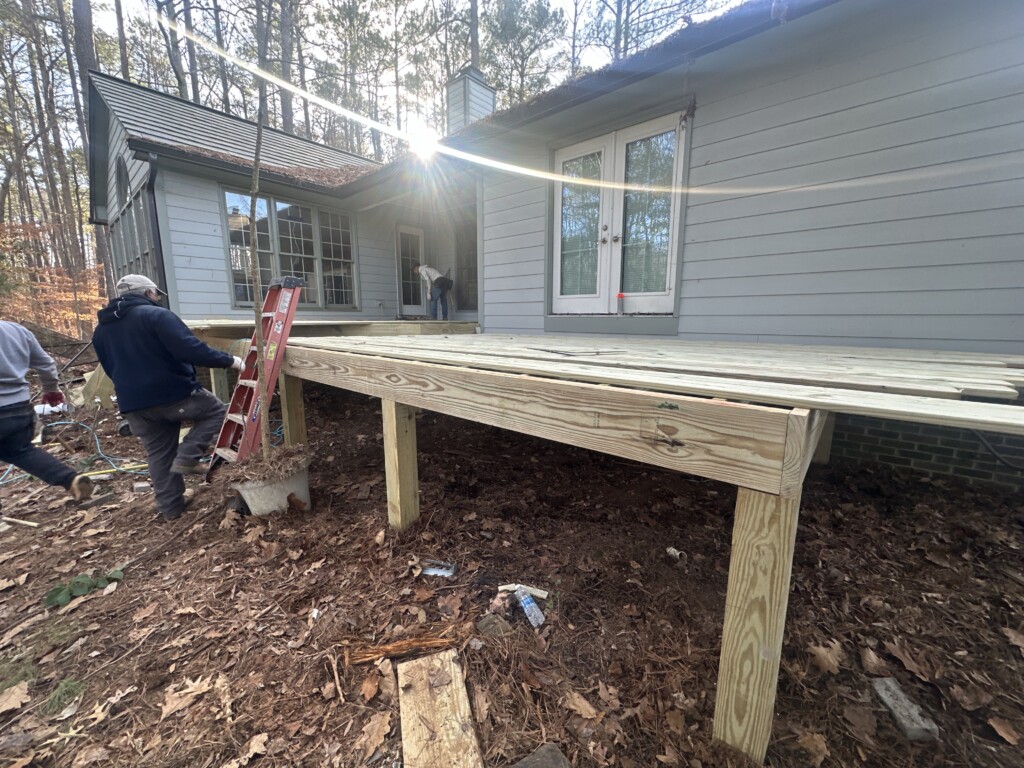
Navigating the permitting process can be complex and time-consuming, making it valuable to work with a builder who handles these details for you. In Raleigh, deck permits are typically required for decks over 30 inches high or attached to the home’s structure.
The permitting process involves submitting detailed plans showing deck dimensions, structural details, and how it integrates with your home. Plans must comply with local building codes, including requirements for foundation depth, beam sizing, joist spacing, and railing specifications. Additionally, some neighborhoods along Reedy Creek Road and Edwards Mill Road have HOA requirements that must be addressed before construction begins.
Ask potential builders about their experience with Raleigh’s permitting process. Do they handle permit applications and fees as part of their service, or is this your responsibility? How familiar are they with local building codes and inspection requirements? What happens if the inspector identifies issues that need correction?
A professional builder should be able to guide you through any HOA approval processes required in your neighborhood and ensure all work complies with both local building codes and community guidelines.
7. What Is Your Payment Schedule?
Be cautious of contractors who demand large upfront payments or full payment before work begins. Legitimate deck builders typically follow a payment schedule tied to project milestones, with the largest payment due upon satisfactory completion.
A reasonable payment schedule might include a small deposit to secure your project date (usually 10-20% of the total cost), progress payments tied to specific milestones (such as completion of framing, decking installation, and railings), and final payment upon satisfactory completion and cleanup.
Avoid contractors who demand payment in cash, ask for full payment upfront, or request unusually large deposits. These practices are often associated with unreliable contractors or potential scams. Additionally, be wary of door-to-door solicitors or contractors who happen to be “working in the neighborhood” and can offer you a special deal if you sign immediately.
8. What Warranties or Guarantees Do You Offer?

Understanding warranty coverage protects your investment and provides peace of mind. There are typically two types of warranties to consider: material warranties (provided by manufacturers) and workmanship warranties (provided by the builder).
Material warranties vary significantly by product. Pressure-treated lumber might carry a limited warranty against structural failure, while composite decking often includes warranties ranging from 10-25 years covering issues like fading, staining, and structural integrity. Your builder should be able to explain the specific warranties applicable to your chosen materials and help you understand what is and isn’t covered.
Workmanship warranties cover issues related to construction quality and typically range from one to several years. This warranty should cover problems like loose railings, uneven decking, or structural issues resulting from improper construction. Ask for warranty details in writing and ensure you understand the process for addressing warranty claims.
A confident builder who stands behind their work will offer reasonable warranties and be transparent about coverage limitations. Be cautious of builders who are vague about warranty terms or reluctant to provide warranty information in writing.
9. How Do You Address Project Changes or Unforeseen Issues?
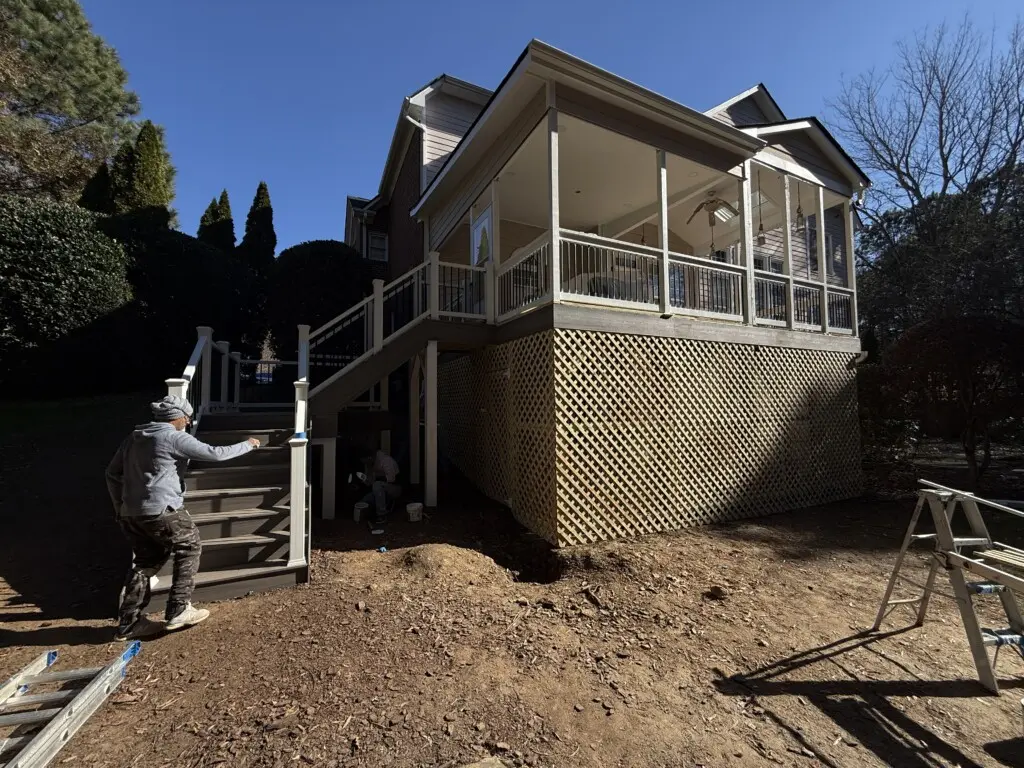
Even well-planned projects can encounter unexpected challenges or opportunities for improvement. Understanding how your builder handles these situations prevents misunderstandings and ensures smooth project execution.
Common unforeseen issues might include discovering structural problems with existing attachments, encountering unexpected soil conditions, or needing to modify plans due to utility line locations. Changes you might request could include material upgrades, design modifications, or additions to the original scope.
Ask potential builders about their change order process. How do they communicate when issues arise? Do they provide written estimates for additional work before proceeding? What is their policy for absorbing minor unexpected costs versus charging for significant unforeseen work?
A professional builder will have a clear process for handling changes, communicate promptly when issues arise, and provide transparent pricing for additional work. They should never proceed with significant changes or additional work without your written approval.
10. What Is Included in Your Quote?

A detailed, written estimate protects both you and your builder by clearly defining project scope, materials, and costs. The quote should include specific details about materials (including brand names and model numbers where applicable), labor, permits, and any other costs associated with your project.
The estimate should specify what is included in the base price and what might be considered additional. For example, does the quote include removal and disposal of an existing deck? Are electrical connections for lighting included? What about staining or sealing of wood materials?
Pay attention to exclusions as well as inclusions. Common exclusions might include landscaping restoration, electrical work requiring a separate electrician, or additional structural modifications discovered during construction. Understanding these details upfront prevents surprise charges later.
Compare quotes carefully, but remember that the lowest price isn’t always the best value. Consider the quality of materials specified, the scope of work included, and the builder’s reputation and experience when making your decision.
Conclusion
Selecting the right deck builder for your Northwest Raleigh project requires careful consideration of experience, credentials, communication, and value. The ten questions outlined above provide a framework for evaluating potential builders and making an informed decision that protects your investment.
Remember that the most important factors are local experience, proper licensing and insurance, quality craftsmanship, and clear communication. Take time to interview multiple builders, check references, and compare detailed proposals before making your final decision.
Your deck represents a significant investment in your home’s value and your family’s enjoyment of outdoor living. By asking the right questions and choosing a qualified, experienced builder, you can ensure your project exceeds expectations and provides years of satisfaction.
If you’re ready to explore deck options for your home, we invite you to contact AAA Fence and Deck for a free consultation. With over 30 years of experience serving the Research Triangle area, we understand the unique considerations of building in this region and are committed to delivering exceptional results that enhance your outdoor living experience.
Frequently Asked Questions
Do I need a permit for my deck project in Raleigh?
Yes, most deck projects in Raleigh require permits. Specifically, you need a permit if you're adding, moving, or replacing 50% or more of an existing deck, or if the deck is over 30 inches high or attached to your home. If your property is in a historic district, you'll also need a Certificate of Appropriateness. Professional deck builders typically handle the permitting process as part of their service.
How much does a typical deck cost in this area?
Deck costs vary significantly based on size, materials, and complexity. Basic pressure-treated lumber decks might range from $15-25 per square foot, while premium composite or exotic wood decks can cost $30-50+ per square foot. Factors affecting cost include deck size, height, railing complexity, built-in features, and site preparation requirements. Always obtain detailed written estimates from multiple qualified builders to compare true project costs.
Can I build a deck if I have an HOA in my neighborhood?
Most HOA communities allow deck construction but require approval before beginning work. HOA requirements vary but typically include restrictions on size, materials, colors, and placement. Some communities require architectural review committee approval, which can take several weeks. Your deck builder should be familiar with common HOA requirements and can help navigate the approval process. Always check your HOA guidelines and obtain written approval before starting construction to avoid potential fines or required modifications.
Multi-Level Deck Designs Perfect for Northwest Raleigh Yards
Northwest Raleigh’s rolling terrain creates beautiful neighborhoods with character and charm, but it also presents unique challenges for homeowners looking to maximize their outdoor living space. If you’re dealing with a sloping or uneven backyard, you’ve probably wondered how to create the functional, beautiful outdoor area you’ve always envisioned. The solution lies in innovative multi-level decks in Northwest Raleigh designed by a trusted deck builder who works with your property’s natural contours rather than against them.
Creating functional and beautiful outdoor living spaces shouldn’t be limited by your yard’s topography. With thoughtful design and professional craftsmanship, even the most challenging slopes can be transformed into stunning entertainment areas that add significant value to your home.
The Northwest Raleigh Terrain Challenge

Northwest Raleigh’s distinctive landscape features rolling hills, mature trees, and natural grade changes that give the area its scenic appeal. However, these same characteristics can create obstacles for traditional outdoor construction projects. Many homeowners in neighborhoods around The Haywood, along Pinecrest Rd, and in areas like Haywood Oaks Dr face similar challenges with sloping lots and uneven terrain.
Common grading and landscape issues include:
- Steep slopes that make traditional patios impractical
- Uneven terrain that creates unusable “dead zones” in backyards
- Drainage concerns on sloped properties
- Limited flat space for outdoor furniture and activities
- Difficulty accessing different areas of the yard
Traditional single-level decks often fall short for sloped lots because they require extensive grading, expensive retaining walls, or result in uncomfortably high structures that feel disconnected from the landscape. These solutions can be costly, disruptive to established landscaping, and may not comply with local building codes regarding deck height and setbacks.
What Are Multi-Level Decks?

Multi-level decks are innovative outdoor structures that feature multiple tiers or platforms connected by steps, walkways, or transitional areas. Rather than fighting against your property’s natural slope, these designs embrace the terrain and create distinct outdoor rooms at different elevations.
Picture a cascading series of outdoor living spaces, each with its own purpose and character. The upper level might feature a dining area that connects directly to your kitchen, while a lower level provides a cozy fire pit gathering space surrounded by integrated planters. Connecting pathways with built-in lighting guide family and guests safely between areas, while strategic railing placement ensures safety without obstructing views.
This approach differs significantly from single-level decks by working with natural grade changes instead of requiring extensive site preparation. The result is a more organic integration with your landscape, better drainage characteristics, and distinct zones that can serve multiple functions simultaneously.
Design Possibilities for Multi-Level Decks
The beauty of multi-level deck design lies in its versatility and customization options. Every property is unique, and your deck should reflect both your family’s lifestyle and your lot’s specific characteristics.
Tiered Composite Decking offers the perfect foundation for multi-level designs. Modern composite materials provide the warmth and beauty of natural wood without the maintenance concerns, making them ideal for Raleigh’s humid climate. These materials resist fading, splintering, and moisture damage while offering consistent color and texture across all levels. Whether your home features traditional brick, modern siding, or classic stone, composite decking complements both contemporary and established architectural styles.
One popular combination I often recommend to Northwest Raleigh families is integrating a screened porch on the upper level with open-air deck spaces on lower tiers. This approach maximizes seasonal comfort – the screened area provides bug-free relaxation during summer evenings, while the open decks offer sun exposure and entertaining space. I recently completed a project where we created distinct zones: a screened dining area connecting to the kitchen, an open grilling deck on the middle level, and a lower sun deck that transitions to a paver patio. This design gives the family four distinct outdoor environments within one cohesive structure.
Seamless Transitions between levels are crucial for both safety and usability. Wide, well-lit steps create comfortable movement between spaces, while strategic landings provide rest points and opportunities for decorative elements. Ramps can be incorporated where accessibility is important, and railings can be designed to define spaces while maintaining sightlines across the entire deck structure.
Built-In Planters and Greenery integration allows your deck to feel like a natural extension of your landscape rather than an imposed structure. Planters can be built into different levels, creating opportunities for seasonal color, privacy screening, or even small vegetable gardens. This approach helps soften the transition between constructed and natural spaces while providing year-round visual interest.
Defined Zones make multi-level decks incredibly functional for families. The upper level might feature a dining area with easy access to the kitchen, while a middle tier provides lounging space with comfortable outdoor furniture. A lower level could house a play area for children or a quiet reading nook surrounded by plantings. Each zone serves a specific purpose while contributing to the overall flow and functionality of the space.
Lighting and Railings serve dual purposes in multi-level designs. Proper lighting ensures safe navigation between levels during evening hours while creating ambiance for outdoor entertaining. LED strip lighting can be integrated into steps, while post lights or overhead string lights define different areas. Railings provide necessary safety features while offering opportunities for decorative elements that enhance your home’s architectural style.
Maximizing Usable Outdoor Space
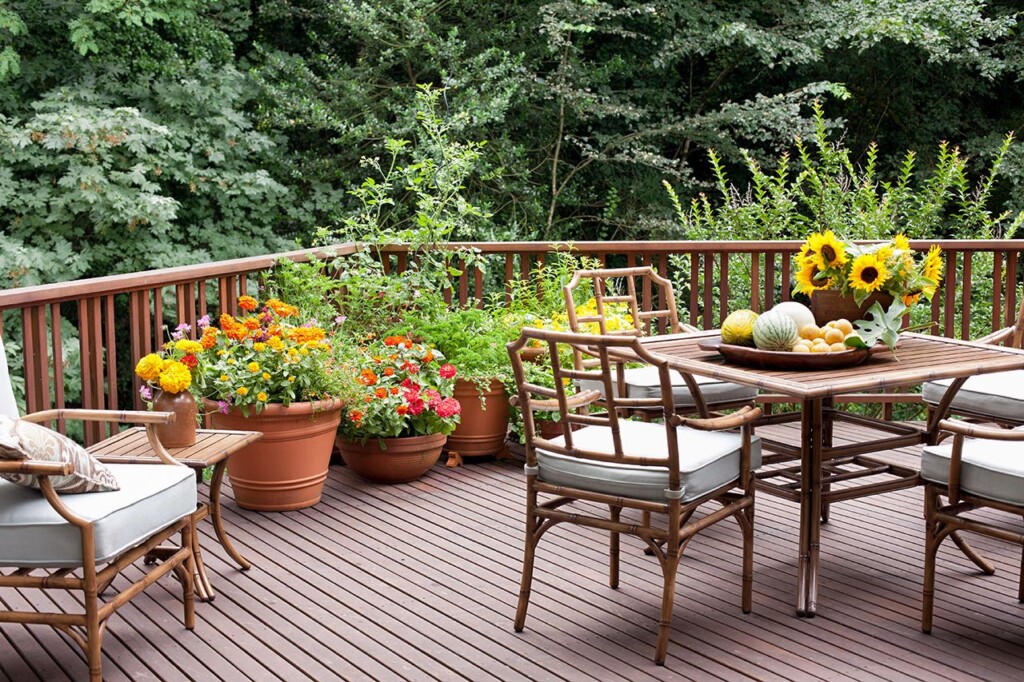
One of the most compelling benefits of multi-level deck design is the ability to transform previously unusable slopes into functional entertainment areas. Consider a typical Northwest Raleigh property with a 15-foot grade change from the house to the back property line. A traditional approach might require expensive retaining walls and extensive grading to create a single usable area.
A multi-level deck approach instead creates three or four distinct spaces at different elevations, actually providing more total usable square footage than a single large deck. The upper level connects to the main living areas, a middle tier provides primary entertaining space, and lower levels can serve specialized functions like outdoor kitchens, hot tub areas, or children’s play spaces.
Case examples from local projects demonstrate this transformation. A recent project near North Ridge Elementary School converted a steep, unusable backyard slope into a three-level entertainment area featuring an upper dining deck, middle-level lounging area with built-in seating, and lower fire pit area surrounded by integrated landscaping. The total usable outdoor space increased from virtually zero to over 800 square feet, while the natural slope drainage improved compared to the original grading.
Another example in the Falls of Neuse area maximized a small but steeply sloped yard by creating intimate spaces at different levels. Rather than one large deck that would have overwhelmed the small lot, the multi-level approach created a sense of spaciousness and privacy while maintaining the mature tree canopy that gives the neighborhood its character.
Custom Solutions from Professional Deck Builders
Creating successful multi-level decks requires expertise in both structural engineering and landscape design. Professional deck builders understand how to work with natural contours while ensuring compliance with local building codes and HOA requirements. In Raleigh, this includes considerations for wind loads, proper drainage, setback requirements, and height restrictions.
Working with natural contours requires careful site analysis and planning. Experienced builders will assess your property’s drainage patterns, soil conditions, and existing vegetation to create a design that enhances rather than disrupts the natural ecosystem. This might involve preserving mature trees by incorporating them into the deck design or positioning levels to work with existing drainage patterns.
Local codes and climate considerations are crucial for long-term success. Raleigh’s building codes require proper permits for multi-level structures, and the city typically requires stamped surveys for complex deck installations. As someone who regularly navigates this process, I handle all permitting requirements and ensure compliance with setback regulations, height restrictions, and structural requirements. Raleigh’s humid subtropical climate also demands specific construction techniques – proper ventilation, moisture barriers, and quality fasteners that can withstand temperature fluctuations, heavy rainfall, and occasional ice storms.
Quality craftsmanship becomes even more important in multi-level designs where structural integrity affects multiple levels and connecting elements. Professional installation ensures proper load distribution, secure connections between levels, and attention to details that affect both safety and appearance.
Collaboration between client and builder is essential for creating personalized solutions that reflect your family’s lifestyle and your property’s potential. This process begins with understanding how you want to use your outdoor space, your budget considerations, and any specific challenges or opportunities your lot presents. The best outcomes result from combining your vision with professional expertise in design and construction.
Pro Tip: Before selecting a contractor for your multi-level deck project, it’s important to ask the right questions when hiring deck builders in Northwest Raleigh to ensure you’re working with qualified professionals.
Integrated Landscaping Elements

Multi-level decks provide unique opportunities to integrate hardscaping and landscaping elements that create a cohesive outdoor environment. Rather than simply adding a deck to your backyard, this approach creates a complete outdoor living system that enhances your entire property.
Retaining walls and stone edging can be incorporated as both functional and decorative elements. These features help define different levels while providing opportunities for integrated seating, planters, or decorative lighting. Natural stone or manufactured materials can be selected to complement your home’s exterior and the deck’s overall design theme.
Planting beds can be built into different levels, creating opportunities for year-round color and texture. These might include perennial gardens, seasonal annuals, or even small trees that provide privacy screening between neighbors. The key is selecting plants that complement the deck’s scale and provide visual interest from multiple viewing angles.
Water features or fire pits can be incorporated into specific levels to create focal points and gathering areas. A fire pit on a lower level creates an intimate conversation area, while a small fountain on an upper level provides soothing background sound for dining areas. These elements help define the purpose of different zones while adding sensory appeal to the overall design.
I’ve also seen clients get creative with entertainment features – one family requested a hot tub on their middle level with privacy screening, while another wanted built-in bench seating around their fire pit area. The key is building deeper and wider decks that can accommodate these special features without feeling cramped. When we integrate paver patios at the base level, it creates a seamless transition between the constructed deck areas and the natural landscape, helping the entire structure feel like it belongs in Northwest Raleigh’s rolling terrain.
The integration of these elements should feel natural and purposeful rather than added as afterthoughts. Professional designers understand how to balance constructed and natural elements to create outdoor spaces that feel both sophisticated and comfortable.
Additional Benefits
Beyond solving the practical challenges of sloped lots, multi-level decks provide several additional benefits that make them attractive investments for Northwest Raleigh homeowners.
Added property value and curb appeal result from creating usable outdoor space where none existed before. Real estate professionals consistently report that well-designed outdoor living spaces provide strong returns on investment, particularly in Northwest Raleigh where outdoor entertaining is popular year-round. The visual impact of a well-designed multi-level deck can also enhance your home’s architectural appeal and neighborhood presence.
Improved accessibility and family-friendly design options make these decks practical for households with varying mobility needs. Unlike steep traditional decks that can be challenging for older family members or young children, multi-level designs can incorporate gentler transitions, wider landings, and multiple access points that accommodate different comfort levels.
The flexibility to create age-appropriate spaces within the same structure means your deck can evolve with your family’s changing needs. Play areas can be converted to entertainment spaces, and quiet retreats can be added as family dynamics change over time.
Transform Your Northwest Raleigh Yard Today

Multi-level deck designs offer Northwest Raleigh homeowners an innovative solution to the challenges of sloped lots and uneven terrain. By working with your property’s natural characteristics rather than against them, these structures create functional, beautiful outdoor living spaces that enhance both your lifestyle and your home’s value.
The transformation possibilities are limitless – from unusable slopes to stunning entertainment areas that rival any indoor living space. Whether you’re dealing with a steep grade, trying to maximize a small yard, or simply wanting to create distinct outdoor rooms for different activities, multi-level deck design provides the flexibility and functionality you need.
Professional design and construction ensure that your investment will provide years of enjoyment while adding significant value to your property. The combination of quality materials, expert craftsmanship, and thoughtful design creates outdoor spaces that truly extend your home’s living area into the natural beauty of Northwest Raleigh’s distinctive landscape.
Ready to explore the possibilities for your property? Contact AAA Fence and Deck today to schedule a free consultation. Our experienced team will assess your lot’s unique characteristics and work with you to design a multi-level deck solution that maximizes your outdoor living potential. Call 984-333-5313 or visit our website to begin planning your backyard transformation.
Frequently Asked Questions
Are multi-level decks more expensive than single-level designs?
While multi-level decks require more complex engineering and construction, they often provide better value by creating more usable space on challenging lots. The cost per square foot of usable outdoor space is often comparable or even lower than extensive grading and retaining wall solutions required for traditional approaches.
How long does multi-level deck construction typically take?
Construction timeline depends on design complexity, size, and site conditions. Most multi-level deck projects are completed within 2-4 weeks, including permitting and site preparation. Weather conditions and material availability can affect specific timelines.
Do multi-level decks require special permits in Raleigh?
Like all deck construction, multi-level designs require building permits when they exceed certain height and size thresholds. Professional builders handle the permitting process and ensure compliance with local building codes, HOA requirements, and setback regulations.
Can existing single-level decks be converted to multi-level designs?
In many cases, existing decks can be expanded or modified to create multi-level systems. This approach can be more cost-effective than complete replacement while achieving the benefits of multi-level design. A professional assessment can determine the best approach for your specific situation.
Essential Deck Maintenance Tips for Northwest Raleigh Homes
Picture this: It’s a perfect spring morning in Northwest Raleigh. You step outside with your coffee, ready to enjoy your deck, only to discover that winter has left behind a surprise—soft, spongy boards that give way under your feet, green algae slick enough to send you sliding, and what looks suspiciously like the beginnings of rot creeping along your railing posts.
Sound familiar? You’re not alone.
Last month, I visited a beautiful home near Hilburn Academy, where the owners were surprised to learn their three-year-old deck needed major repairs. “We thought we were doing everything right,” they told me. “We power-washed it once a year and touched up the stain when it looked faded.” The problem?
The humid subtropical climate of our region, combined with seasonal temperature swings and frequent rainfall, creates unique challenges for homeowners. Without proper care, even the highest-quality decks can succumb to moisture damage, mold growth, and structural deterioration. The good news? With the right maintenance approach and the help of a trusted deck builder in Northwest Raleigh, you can protect your deck’s appearance, safety, and your property’s overall value.
Climate Challenges in Northwest Raleigh, NC

Northwest Raleigh and the broader Northwest region’s weather patterns present a perfect storm of conditions that can impact your deck’s longevity. From the busy corridors near Hilburn Dr and Pike Rd to the quieter residential areas, our region experiences hot, humid summers with temperatures often exceeding 90°F, coupled with high humidity levels that can reach 70-80%. These conditions create an ideal breeding ground for mold and mildew, while the moisture can penetrate wood fibers, causing swelling and eventual decay.
Winter brings its own challenges with temperature fluctuations that can range from freezing to mild within days. This freeze-thaw cycle causes expansion and contraction in deck materials, leading to cracks, splits, and loose fasteners. Spring and fall often deliver heavy rainfall, with North Carolina receiving an average of 43 inches of precipitation annually, much of which falls during intense storm events.
Common deck issues in our climate include:
- Moisture-related damage, such as wood rot and decay, that compromises structural integrity
- Mold and mildew buildup that creates unsightly and slippery surfaces
- UV fading from intense summer sun exposure strips away protective finishes
- Warping and cupping of deck boards due to moisture absorption and temperature fluctuations
- Rust and corrosion of metal fasteners and hardware can lead to loose connections
Regular Cleaning and Inspection
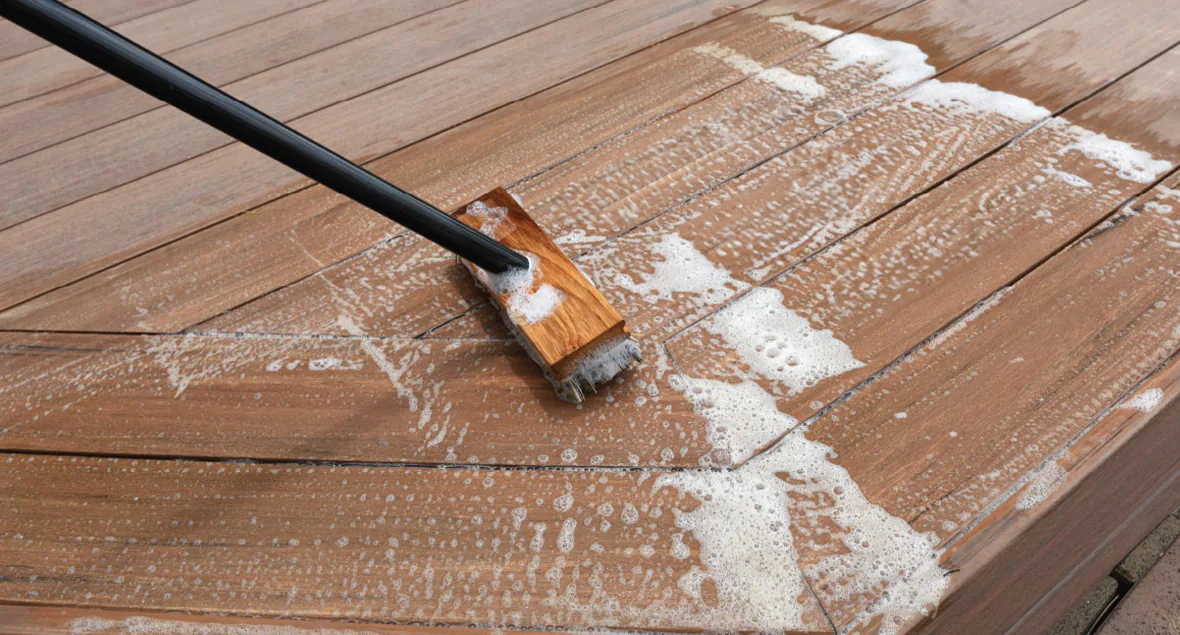
The foundation of effective deck maintenance lies in consistent cleaning and thorough inspections. Regular cleaning prevents the accumulation of moisture, organic debris, and contaminants that can lead to mold, algae growth, and wood degradation. In Northwest Raleigh’s humid environment, this routine becomes even more critical.
Establish a weekly visual inspection routine, walking your entire deck and looking for loose or protruding screws and nails, soft spots or spongy areas when you step down, cracks or splits in deck boards, areas where water pools rather than drains properly, and signs of insect activity or wood-boring pests. Monthly, conduct a more thorough inspection that includes checking railings for stability, examining the ledger board connection to your house, inspecting support posts and beams for damage, and testing stairs and handrails for wobbling or looseness.
For effective cleaning, you’ll need a stiff-bristle brush or broom for scrubbing, a garden hose with good water pressure, mild detergent or specialized deck cleaner designed for your material type, and a putty knife for removing debris from between boards. Consider investing in a deck brush with an extended handle to make the cleaning process more comfortable and thorough.
Repairing Damaged Boards Promptly
In North Carolina’s challenging climate, small problems can quickly become major issues if left unaddressed. Learning to identify when a deck board needs attention can save you significant time and expense down the road.
Signs that demand immediate attention include:
- Splintering that creates safety hazards for bare feet and indicates wood deterioration
- Soft or spongy spots that indicate rot or water damage beneath the surface
- Visible warping that creates trip hazards or allows water to collect in problem areas
- Cracking that allows moisture penetration deep into the wood fibers
- Discoloration that suggests mold, decay, or other moisture-related issues
For minor repairs, you can often handle the work yourself with basic tools. Sand down rough spots and splinters, apply wood filler to small cracks and holes, replace individual screws or nails that have worked loose, and treat small areas of mildew with appropriate cleaning solutions.
However, know when to call professionals. If you notice structural sagging or bouncing when walking on the deck, multiple boards showing signs of rot or severe warping, problems with railings or stairs that could impact safety, or damage to the underlying support structure, it’s time to search for experienced “deck builders near me” who understand the specific challenges of Northwest Raleigh’s climate.
Protective Finishes: Staining, Sealing, and Painting
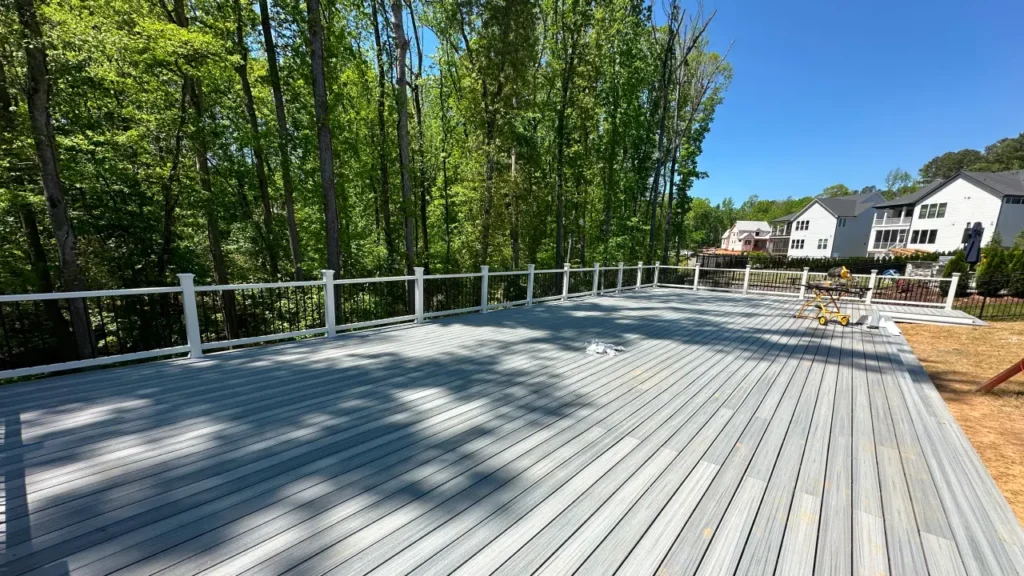
In North Carolina’s harsh climate, protective finishes serve as your deck’s first line of defense against moisture, UV rays, and temperature fluctuations. The key is choosing the right product and maintaining a consistent application schedule.
For wood decks, penetrating stains offer excellent protection while allowing the wood’s natural beauty to show through. These stains soak into the wood fibers, protecting from within while allowing the wood to breathe naturally. Semi-transparent stains offer a good balance of protection and aesthetics, while solid stains provide maximum protection but hide the wood’s natural grain.
A Word of Caution About Paint: I recently spoke with a homeowner who inherited a painted deck from previous owners. After just one year of normal family use—including pets running in and out—the paint was already peeling and flaking in high-traffic areas. This is exactly why we strongly advise against painting decks.
Paint creates a thick film on the surface that inevitably chips and peels, requiring complete stripping and repainting rather than simple reapplication. If you currently have a painted deck showing wear, consider this the perfect opportunity to strip it down and switch to a quality semi-transparent stain that will fade gracefully rather than peel away.
Composite decks require different care approaches. While they’re designed to be low-maintenance, they still benefit from periodic cleaning and the application of composite-specific products that can help restore color and provide additional UV protection.
Apply finishes during mild weather conditions, avoiding extremely hot, cold, or humid days. The ideal temperature range is between 50-80°F with humidity below 50%. Ensure your deck is completely clean and dry before application, and allow adequate drying time between coats and before foot traffic.
Power Washing Techniques for Northwest Raleigh Decks
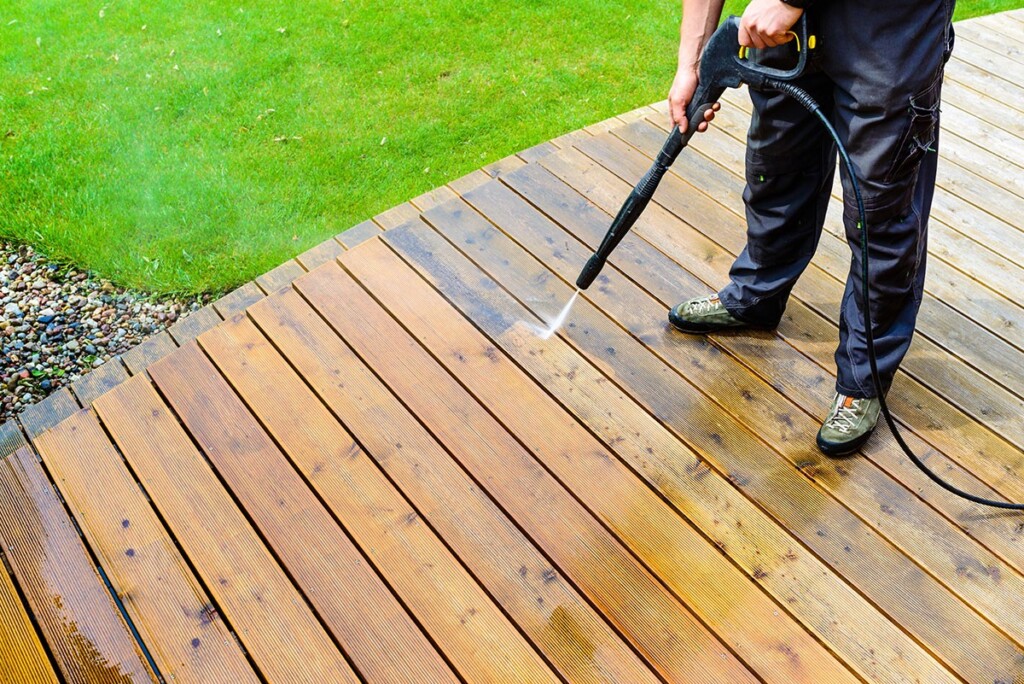
Power washing is especially useful for decks in shady areas like Glen Forest or near Umstead State Park, where organic buildup and mildew are more common due to dense tree cover and reduced airflow. However, in the hands of an inexperienced user, a pressure washer can cause significant damage to deck boards.
The benefits of proper power washing include the removal of embedded dirt and organic matter, elimination of mold and mildew, preparation of surfaces for new stain or sealant, and restoration of wood’s natural appearance. For most deck materials, keep pressure settings between 500-600 PSI for softwoods and up to 1200 PSI for hardwoods.
Use a fan tip rather than a concentrated stream, maintain a consistent distance of 12-18 inches from the surface, and work along the grain of the wood, not against it. Always test the pressure on an inconspicuous area first, and consider using a deck-specific cleaning solution in conjunction with the pressure washer for best results.
Professional Tip: While power washing can be effective for routine cleaning, I don’t recommend it for paint or stain removal. I’ve seen too many homeowners damage their deck boards trying to strip old finishes with high pressure. If you’re dealing with peeling paint or heavy buildup, proper scraping and sanding with 60-80 grit sandpaper will give you better results without risking wood damage. Always sand along the grain, never against it, and use a pole sander or electric pad sander for consistent coverage.
Annual power washing is typically sufficient for most Northwest Raleigh decks, though decks with heavy tree cover or those that see little direct sunlight may benefit from bi-annual cleaning.
Preventing Mold, Mildew, and Moisture Damage

Prevention is always more effective and cost-efficient than remediation when it comes to mold and moisture issues. In Northwest Raleigh’s humid climate, creating conditions that discourage mold growth should be a priority for every deck owner.
Ensure proper airflow around and under your deck by:
- Trimming vegetation that blocks air circulation and creates stagnant moisture pockets
- Avoiding furniture placement that traps moisture against deck surfaces for extended periods
- Maintaining adequate spacing between deck boards for proper drainage and ventilation
Position your deck to receive maximum sun exposure when possible, as UV rays naturally inhibit mold growth.
Make smart landscaping choices by planting shrubs and trees at appropriate distances to avoid excessive shade, using mulch sparingly near deck areas to reduce moisture retention, and ensuring proper grading so water flows away from the deck structure.
For treatment options, natural solutions like white vinegar and baking soda can effectively address minor mold issues, while commercial mold and mildew cleaners provide more aggressive treatment for established problems. Always follow manufacturer instructions and test any cleaning product on a small, inconspicuous area first.
When to Contact Deck Builders Near Me for Help

Some deck upkeep can be DIY, but major issues need professional care. Knowing when to call prevents small problems from turning into costly repairs.
Whether you’re dealing with routine maintenance, major repairs, or considering innovative multi-level deck designs for your Northwest Raleigh property, working with trusted deck builders provides the expertise needed for long-term success.
When searching for “deck builders near me” in Northwest Raleigh, whether near Pleasant Valley Promenade or Glenwood Ave, choose licensed and insured contractors with good reviews, experience in your deck material, and knowledge of local codes and weather. Reliable builders give detailed estimates, use durable materials for North Carolina’s climate, and back their work with warranties.
Combining your own cleaning and inspections with professional maintenance keeps your deck safer and helps it last longer.
Frequently Asked Questions
What's the best time of year to apply deck stain or sealant?
Late spring or early fall provide ideal conditions, with moderate temperatures and lower humidity levels that allow for proper curing.
How can I tell if my deck boards need professional replacement?
If boards feel soft or spongy underfoot, show extensive cracking, or have areas of rot larger than a quarter, professional replacement is recommended.
Should I use a roller or brush to apply deck stain?
Always use a brush for deck staining. I've learned from experience that rollers provide wildly uneven coverage due to the natural undulation in deck surfaces. A quality brush ensures the stain penetrates properly into the wood grain and provides consistent protection across the entire surface.
How long should I wait between power washing and applying new stain?
Allow your deck to dry completely for at least 24-48 hours after power washing before applying any finishes, longer if humidity levels are high.
What maintenance tasks can I do myself versus when should I call professionals?
Homeowners can typically handle cleaning, minor board repairs, and finish applications. Call professionals for structural repairs, extensive rot damage, or safety-critical issues with railings and stairs.

